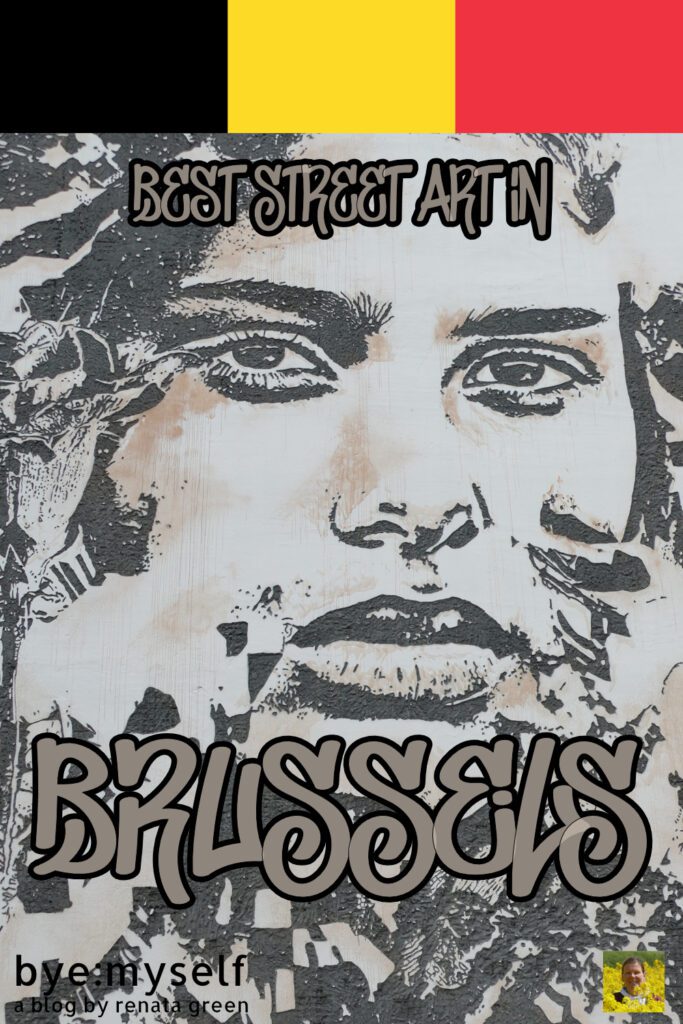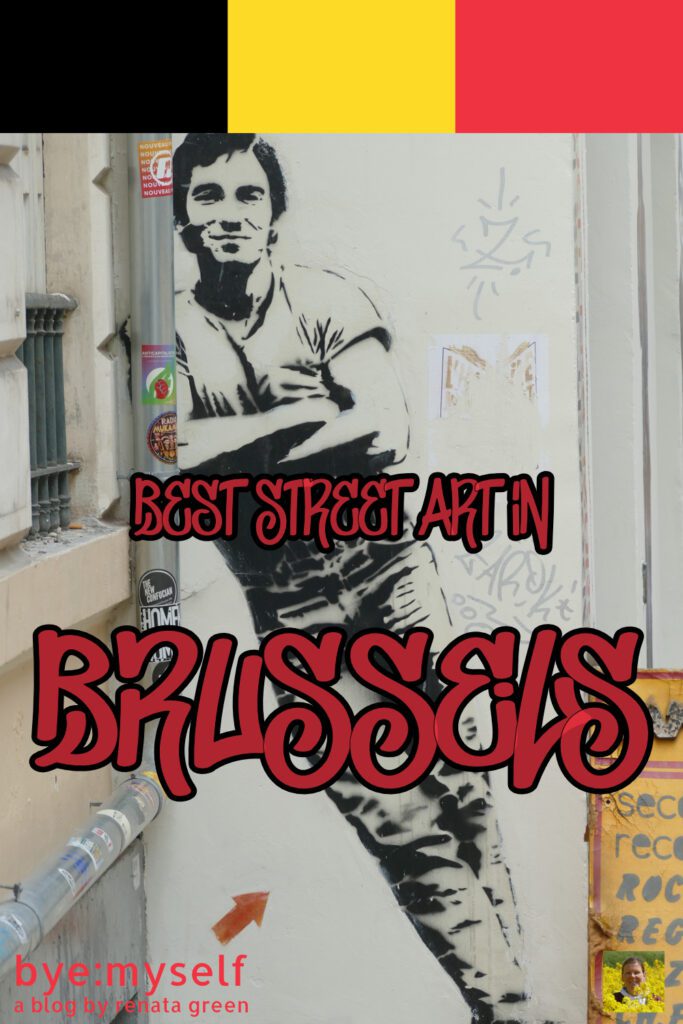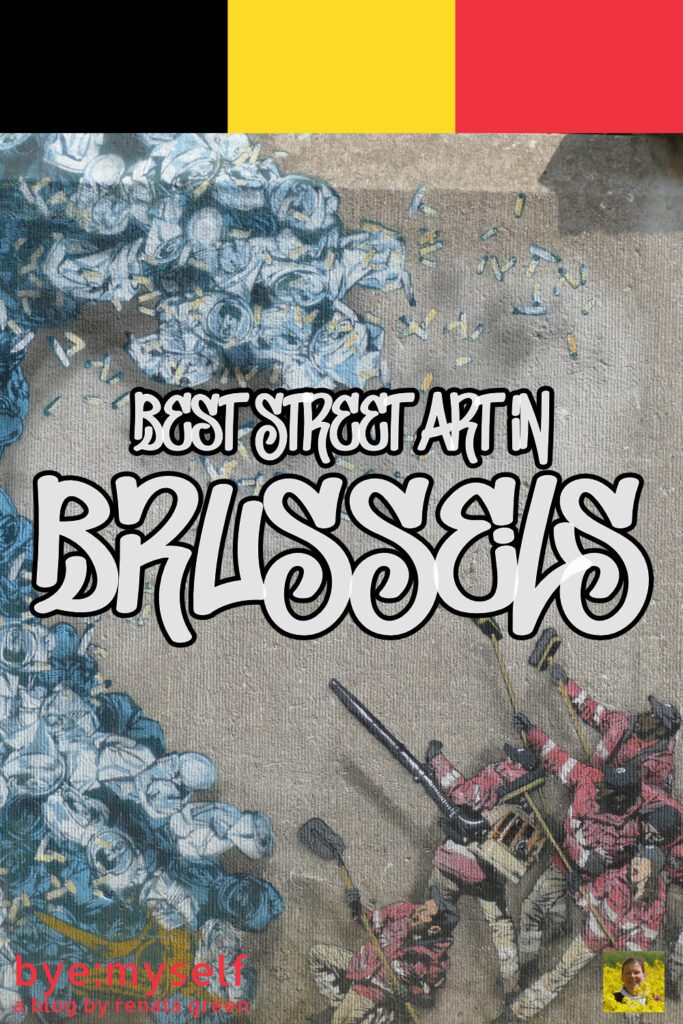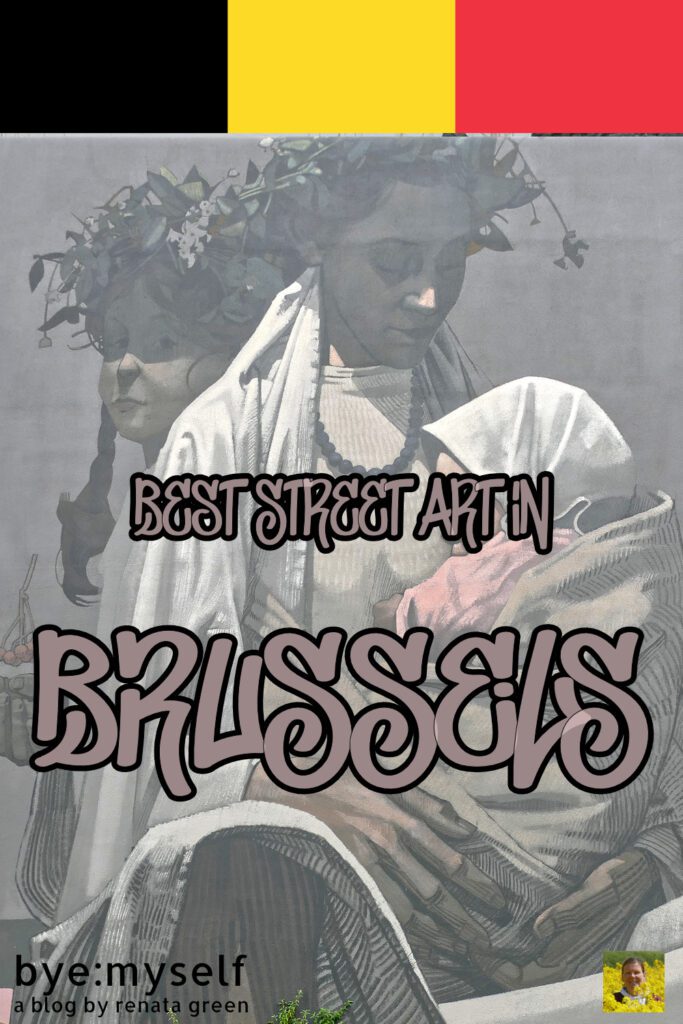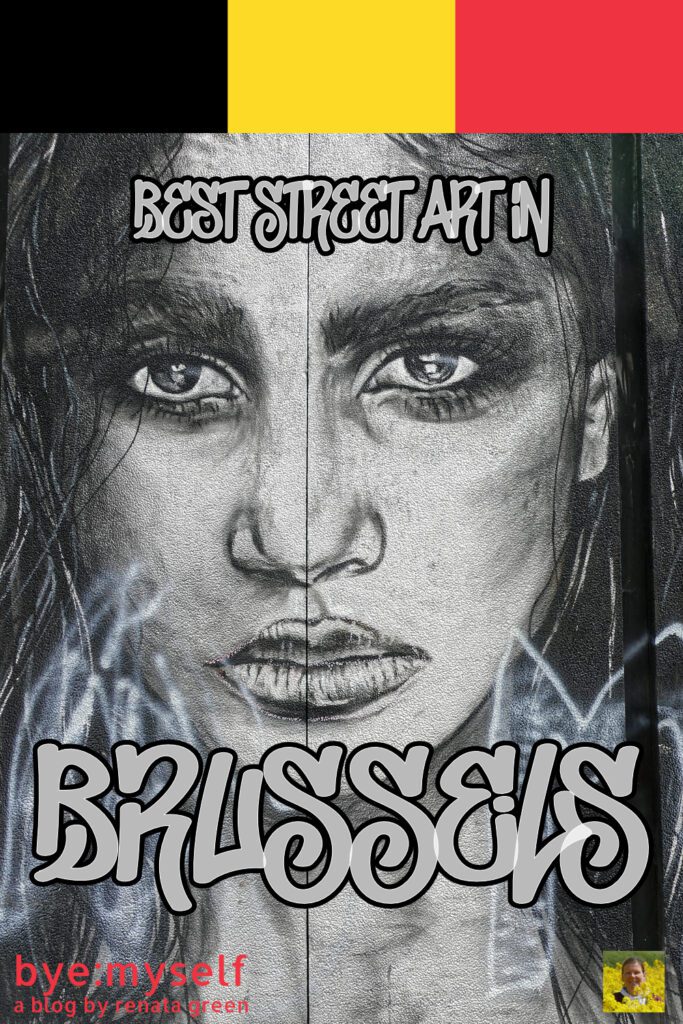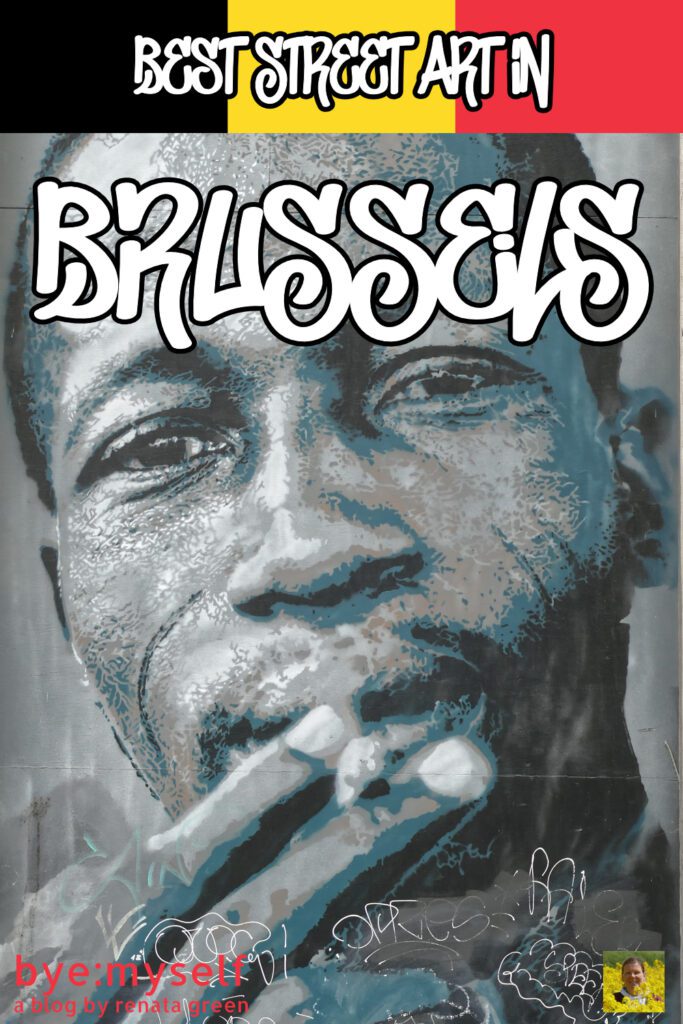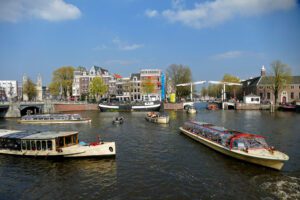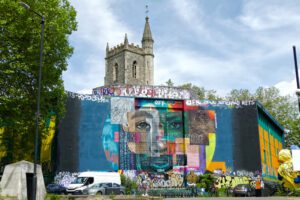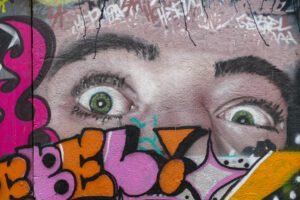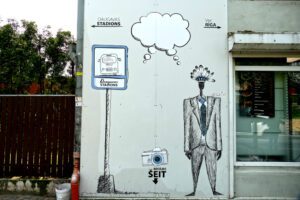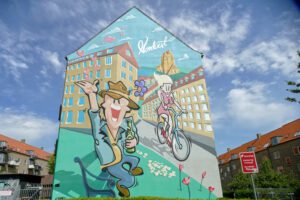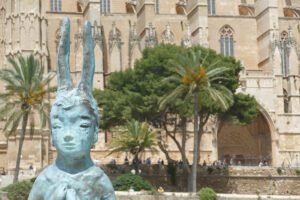Brussels is famous for many things: The European Parliament, the Atomium, beer, waffles, and comic books. Belgium’s capital celebrates the latter even in a beautiful street art project called Parcours Bande Dessinée. I’ve introduced many of the walls decorated by beloved comic book characters in my former post The Best Murals Along Brussels’ Comic Book Route.
But how about other murals that are not comic-themed?
What a question!
In Belgium, you’ll find grand street art even in the smaller cities.
So of course there are amazing powerful murals all around the country’s capital – and in this post, I’m telling you where to find the best street art Brussels has in store.
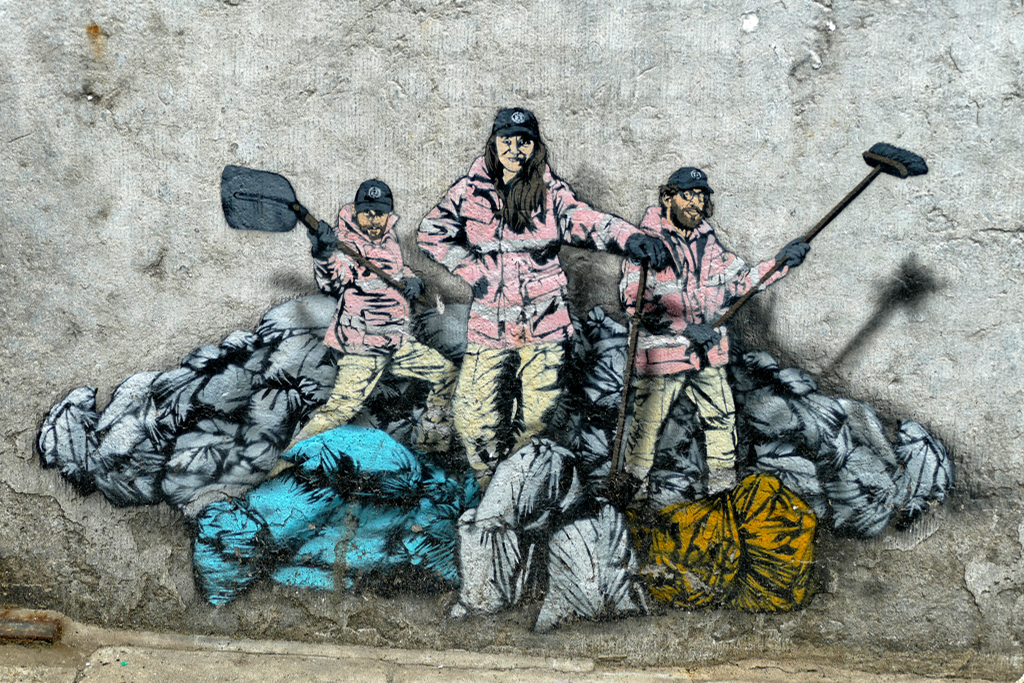
- Street Art in Brussels
- The Artists
- Freskolab
- Mónika Kárándi – Laura Dauchet – Blanca Gracia
- Jaune
- Edward von Lõngus
- VHILS
- Jef Aérosol
- HMI
- BONOM
- Mr Doodle
- MISS CHELOVE
- LaetiCNN199
- DEMA
- Ledia Kostandini
- ojoMAGico
- Alba Fabre Sacristán
- La Dame Quicolle
- Bruce Clarke
- Mona Tusz
- SAINER
- SHIRO
- Anthea Missy
- FSTN
- NEAN
- Jana Danilović
- Piotr Szlachta
- Alexis Corrand
- Arno 2bal
- Nô
- Sestry Feldman – Teresa Sdralevich
- Céleste Gangolphe – Florianne Mandin – Mathieu Mary
- Guillaume Desmarets
- MEDIANERAS
- Amandine Lesay
- NovaDead
- On Instagram
- How To Get Around
- Map
- Pinnable Pictures
Street Art in Brussels
There aren’t just a couple of keywords that can define street art in all its shapes and forms. As a matter of fact, the art of sketching and painting on walls goes way back to the cavemen, to the era of the Pyramids in Giza, as well as the Roman Empire. Also, larger-than-life wall paintings have been popular in Latin America for a very long time. The most famous muralist was probably Frida Kahlo’s husband Diego Rivera.
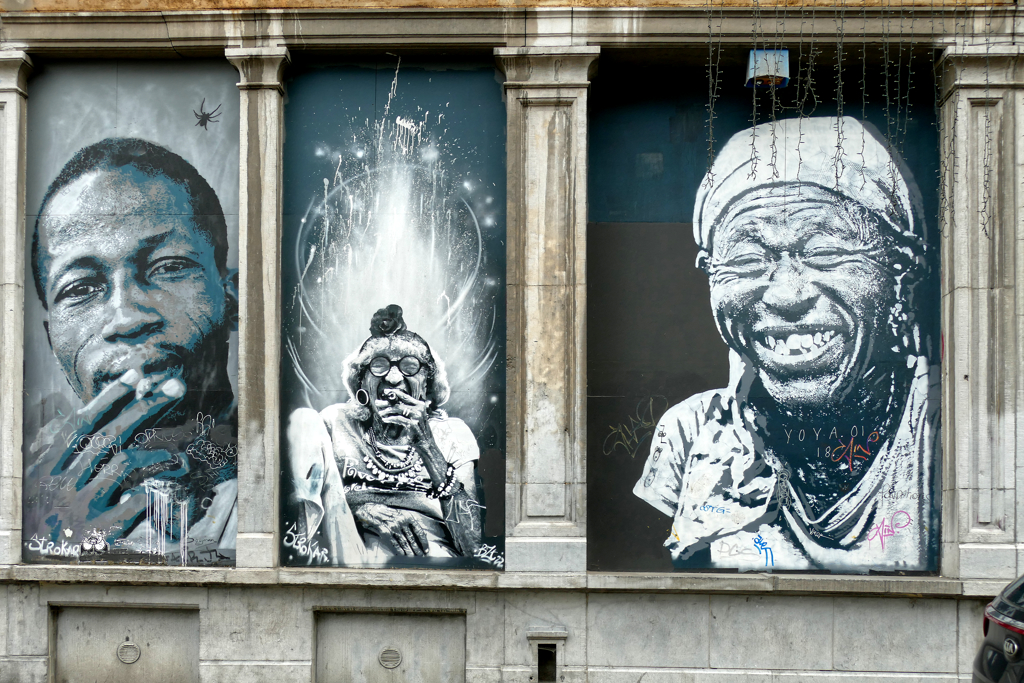
But like virtually everywhere else in the world, the roots of contemporary street art in Brussels can be traced back to the 1980s, when graffiti and urban art movements emerged worldwide. As in many other cities, urban art here began with graffiti. Young artists inspired by hip-hop culture and New York’s graffiti scene began spray-painting walls and trains.
But since then, street art has become an important form of cultural expression and has been increasingly recognized as a legitimate art form. The collaboration of artists with local authorities and cultural institutions promoted this development.
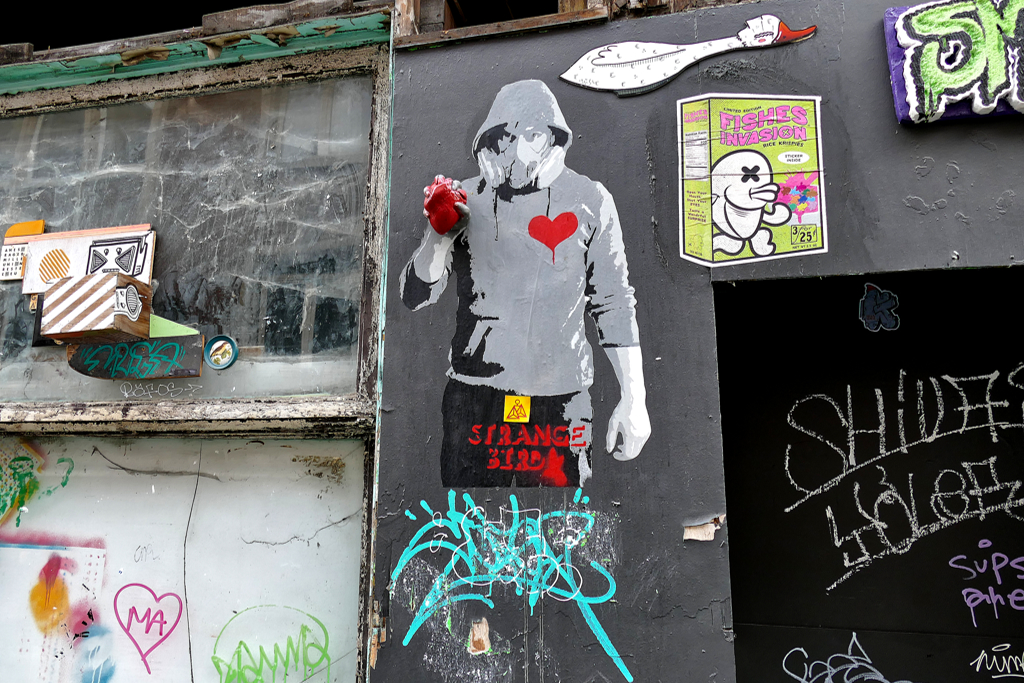
Well-known street artists such as Bonom, ROA, and others contributed to the notoriety and respect of the street art scene in Brussels. ROA is known for his large-format, detailed black-and-white animal images and is a superstar in the international street art scene. I introduced him in detail in my street art posts in Berlin, Malaga, Paris, and Puerto de la Cruz.
Celebration of Beauty
More and more city administrations are legalizing and even promoting street art. This happens, for example, in Brussels in the form of special festivals and events such as the Street Art Parcours, an annual event focused on promoting and exhibiting street art in Brussels. The event includes tours of new and existing murals, workshops, and meetings with the artists. Another major festival that has been held annually since 2007 is Balkan Trafik! which celebrates the diverse cultures of the Balkans and Southeast Europe and promotes cultural exchange in the areas of music, cinema, gastronomy – and of course visual arts including street art. Balkan Trafik! usually takes place over several days in April. It attracts a diverse audience, including members of the Balkan diaspora, local Belgians, and international visitors. The festival has grown over the years to become a significant event in Brussels’ cultural calendar.
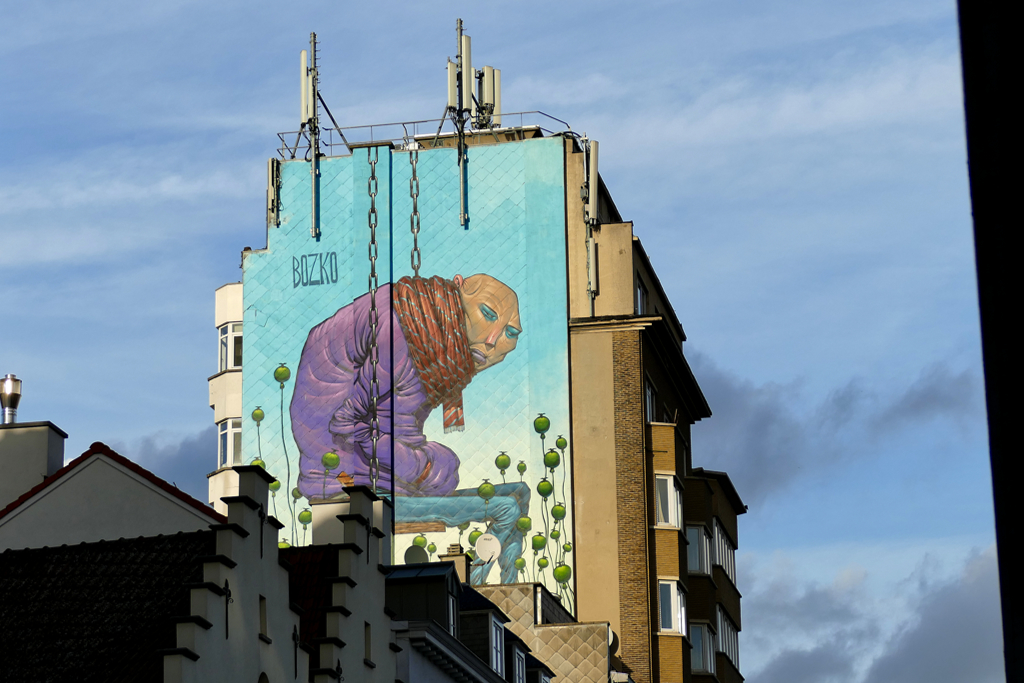
Another significant street art festival is La Belle Hip Hop. This annual street art festival celebrates women in hip-hop culture. The festival features a diverse array of events, including live graffiti, dance performances, music, and workshops, all led by female artists. It aims to empower women in the arts and provide a platform for their creative expression in a traditionally male-dominated genre. The event brings together artists from around the world, fostering a vibrant and inclusive atmosphere that highlights the contributions of women to hip-hop culture.
There’s More
Aside from the festivals, there are numerous hotspots for street art in Brussels. The Marolles district is best known for its lively street art scene. Here you will find multiple murals and graffiti artworks by local and international artists.
There are also many large-scale murals and graffiti artworks along the canal, adding to the industrial atmosphere of the area.
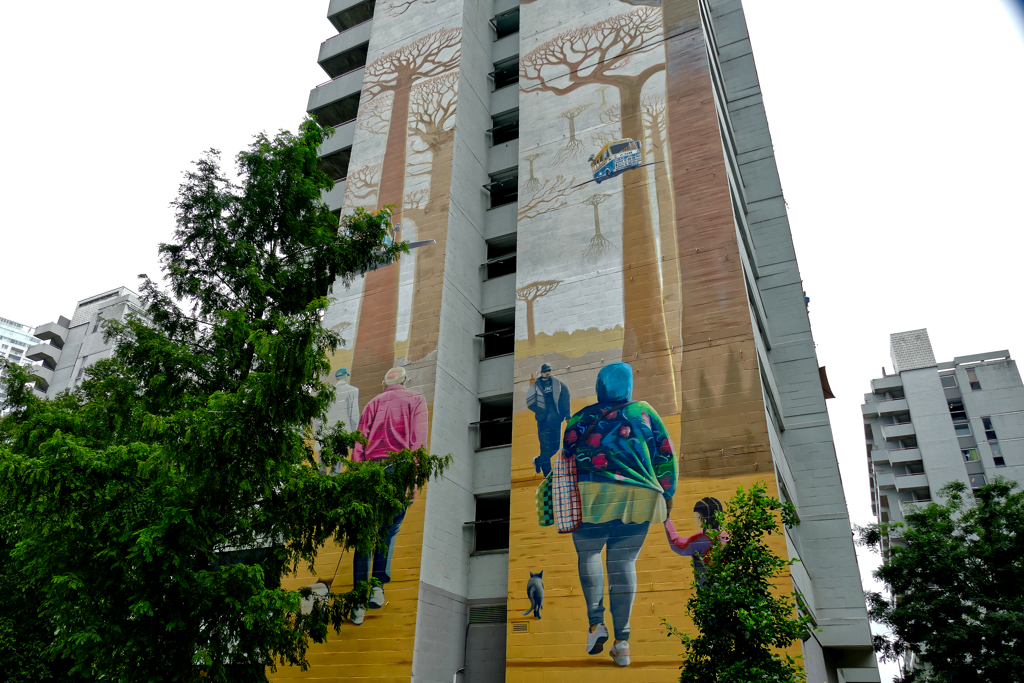
Brussels has therefore become an important center for street art. With a rich history, a variety of talented artists, and a vibrant festival scene, the city offers a dynamic platform for this art form. Local authorities and cultural institutions’ recognition and promotion of street art have helped Brussels become an important venue for urban art. Whether through permanent murals or temporary festival installations, street art in Brussels is an integral part of the city’s cultural landscape.
The Artists
Starting in the city center of Brussels at the central station, my presentation of the best artists and their works goes a bit all over the city. I tried to create as logical a route as possible with short distances so that you have the opportunity to see as many of the works as possible in one course. Otherwise, at the end of this post, there is a map from which you can pick out the works that interest you most and that you definitely don’t want to miss. Below you will also find a list of the Instagram accounts of the featured artists, where they are all listed in alphabetical order.
Freskolab
Delphine Frantzen, Romane Balthazart, and Luka Rakol founded Freskolab in 2019 and have been carrying out street art projects ever since. After they were allowed to paint the Jamar underpass near the Gare du Midi in response to a project call, the collective is now motivated to draw attention to the challenges facing society with their murals.
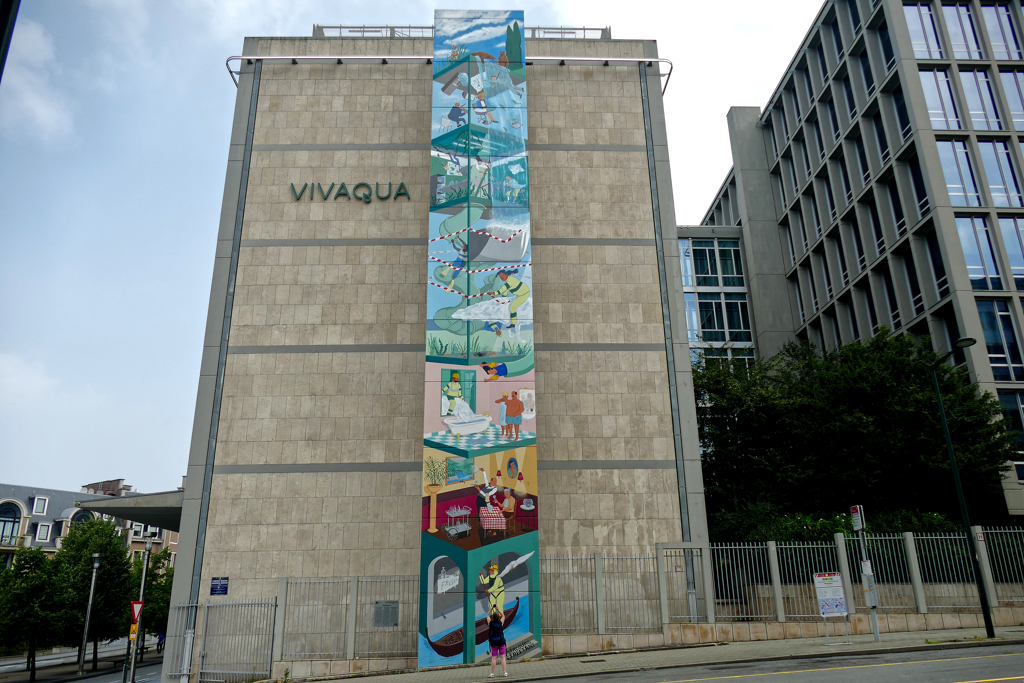
This also includes the mural on the façade of the Vivaqua headquarters. In the upper part of the picture is a waterfall as a spring, below various motifs show the importance of water and remind people to use it prudently.
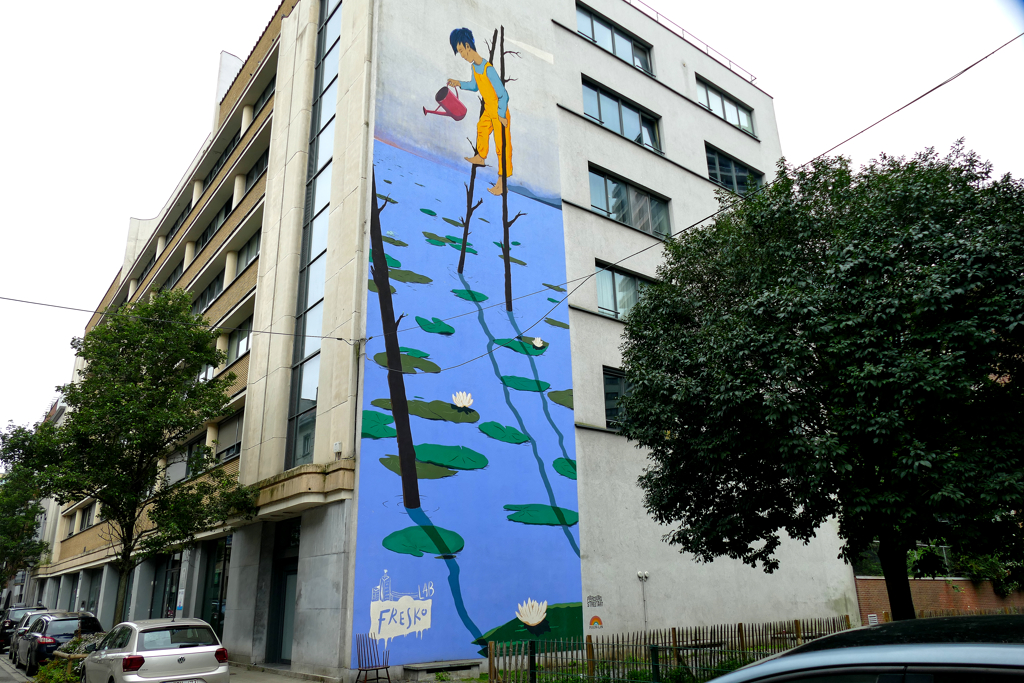
Mónika Kárándi – Laura Dauchet – Blanca Gracia
Not far from the Vivaqua headquarters is the Place d’Espagne square. This pedestrian square is surrounded by neo-baroque buildings. There is also a sculpture of Don Quixote and Sancho Panza as well as a statue of the Hungarian composer Béla Bartók.
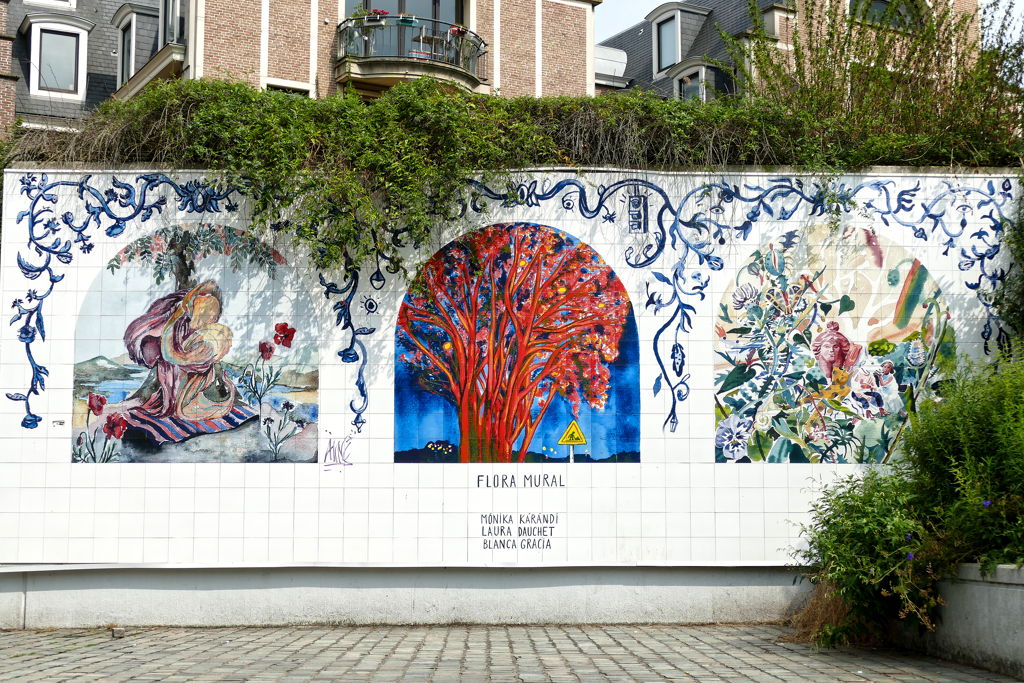
The square is a reminder of the close relations between the Habsburgs of Spain and the southern Netherlands. This probably explains why the works of Mónika Kárándi from the Hungarian city of Debrecen, the Spaniard Blanca Gracia, who lives and works between Barcelona and Madrid, and Laura Dauchet, who was born in Bayonne but now lives in Brussels, are presented here. Titled Flora Mural, they embellish a tiled wall.
Jaune
Guys, I have a new favorite street artist, and he stencils under his artist name Jaune. Since 2011, Jonathan Pauwels, as his real name is, has been memorializing street workers around 40 centimeters tall in his art projects.
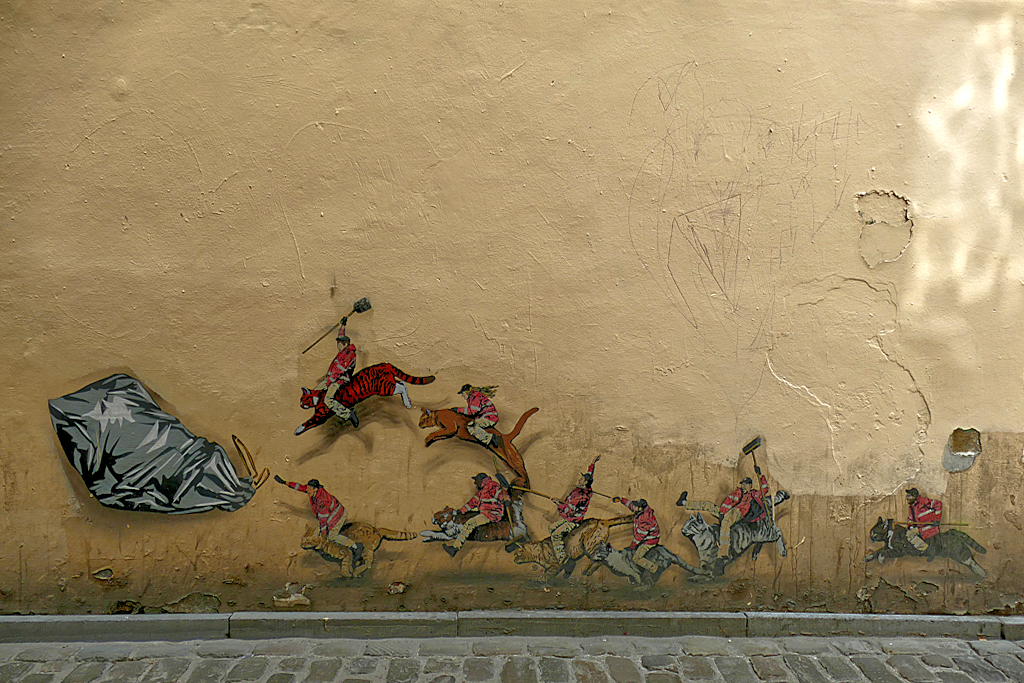
In doing so, he recognizes their overlooked and yet so important work. His miniature garbage men heroically lead the fight against oversized garbage bags and overwhelming garbage tsunamis.
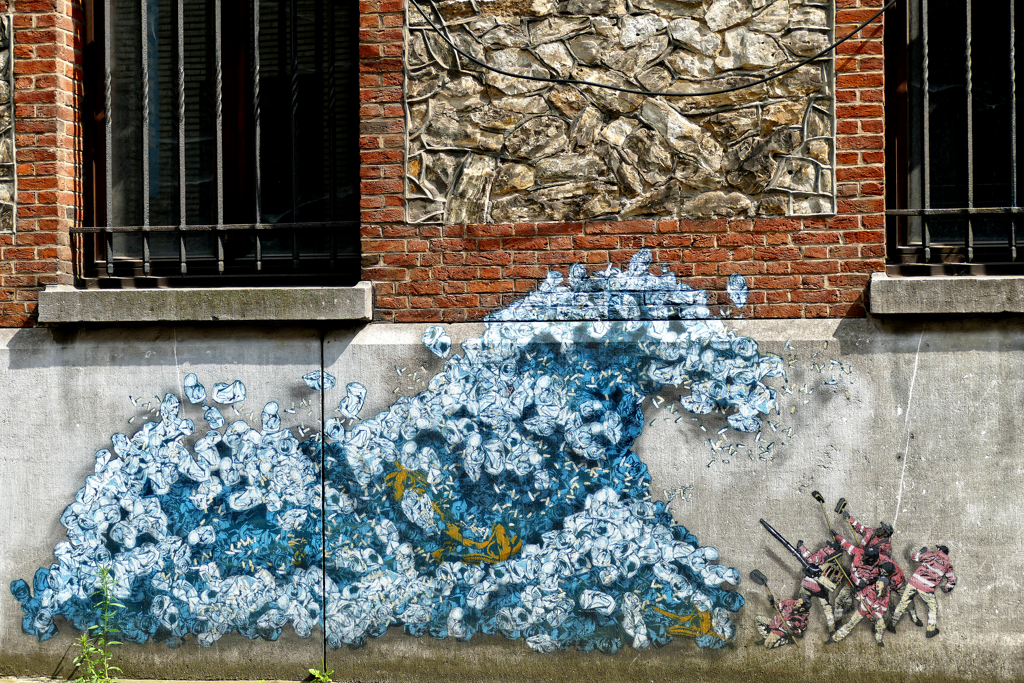
By creating with stencils, the self-taught artist achieves an impressive level of detail that makes his works almost a kind of hidden object picture with many charming details.
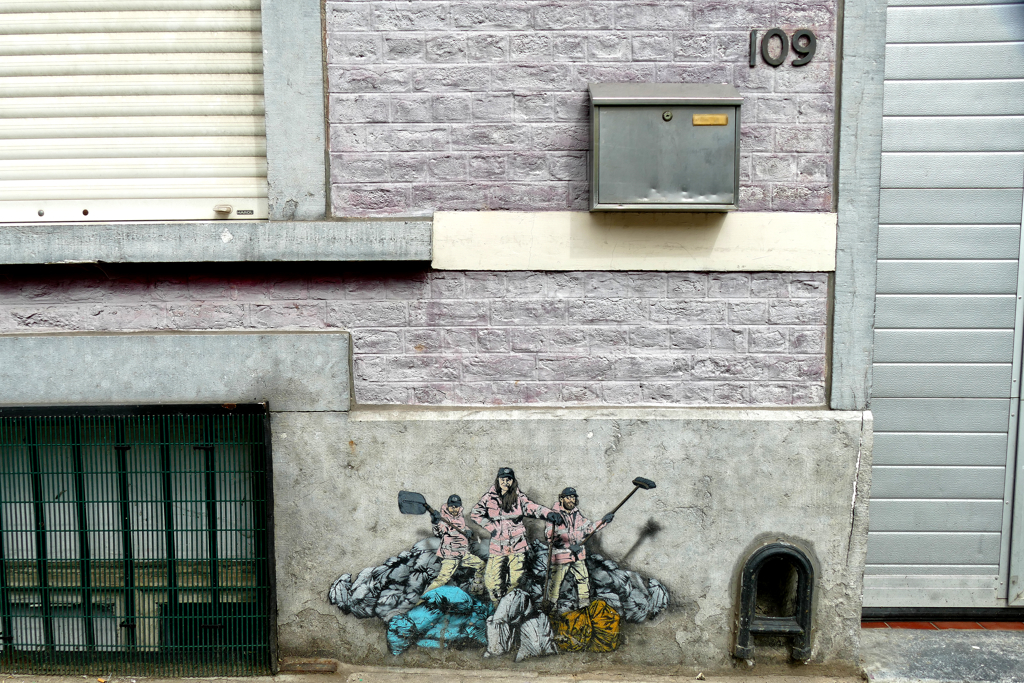
Shortly after I had fallen in love with Jaune’s work, I was thrilled to see more of his art during my trip to Portugal. You’ll find it in the post Best Street Art in Porto.
Edward von Lõngus
Edward von Lõngus is an Estonian stencil artist who is often compared to Banksy because of his style, socio-political themes, and enigmatic identity.
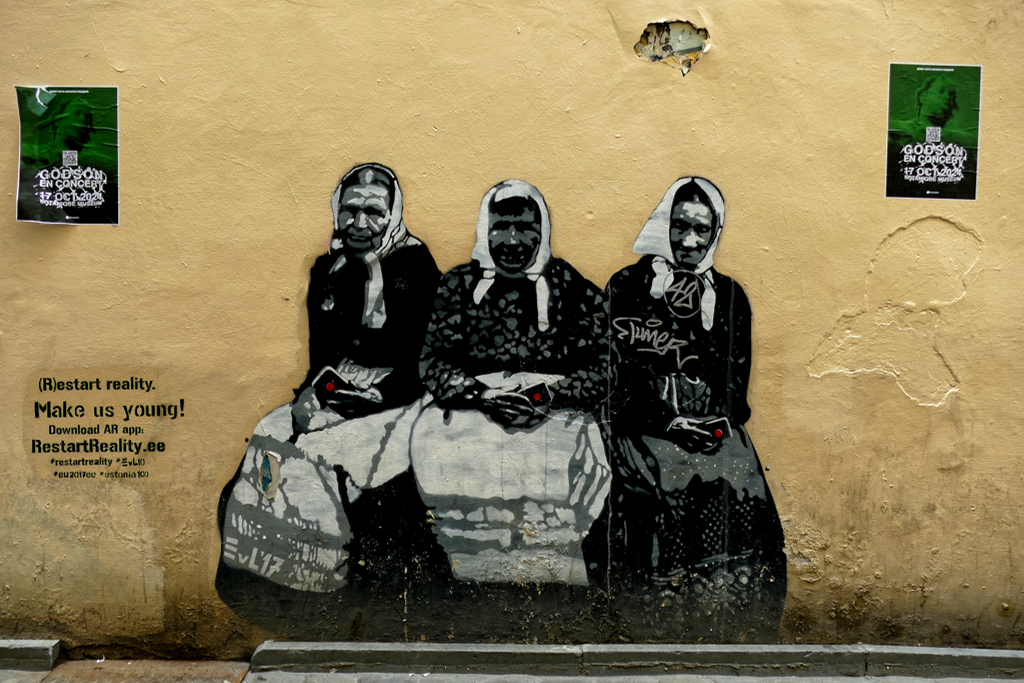
As part of his digital street art project (R)estart Reality, which took place as part of the Estonian Presidency of the European Union and the cultural program for the celebration of the 100th anniversary of the Republic of Estonia, he painted in Berlin, Brussels, Budapest, Copenhagen, Helsinki, London, Paris, Riga, Rome, Vienna, and Vilnius motifs that are closely linked to Estonian culture and history. Each character then tells something about Estonian traditions via an augmented reality app.
The Estonian Ministry of Foreign Affairs awarded Edward von Lõngus the 2018 Culture Prize for this work.
I’ve also introduced Edward von Lõngus’s art project in my posts on RIGA – a guide to Latvia’s entrancing capital and Best Street Art in Vilnius.
VHILS
Alexandre Manuel Dias Farto aka VHILS who lives and works in London and Lisbon takes the opposite approach of other artists: he doesn’t add, instead he strips away. He carefully removes layers of walls using heavy tools, creating hyper-realistic portraits. As a result, he has developed an absolutely unique visual language.
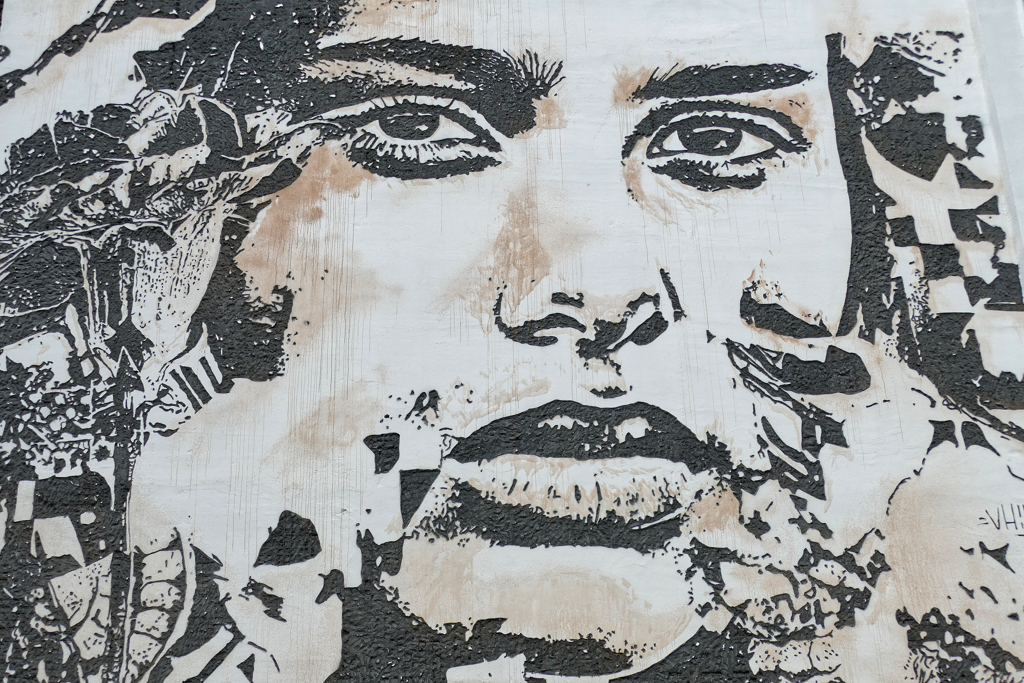
The Portuguese artist has been presenting his work worldwide since 2005 not only on the street, but also in exhibitions, events, and various projects. He has worked with renowned institutions around the world as well as with communities in the favelas of Rio de Janeiro.
As experimental as VHILS is, in addition to his iconic bas-relief murals, he has worked in a variety of media: from stencil painting to metal etching, from videos to sculptural installations.
VHILS has also directed music videos, short films, and two stage productions.
I’ve introduced VHILS’ murals also in my post on Best Street Art in Berlin, Best Street Art in Porto, as well as Best Street Art in Lisbon.
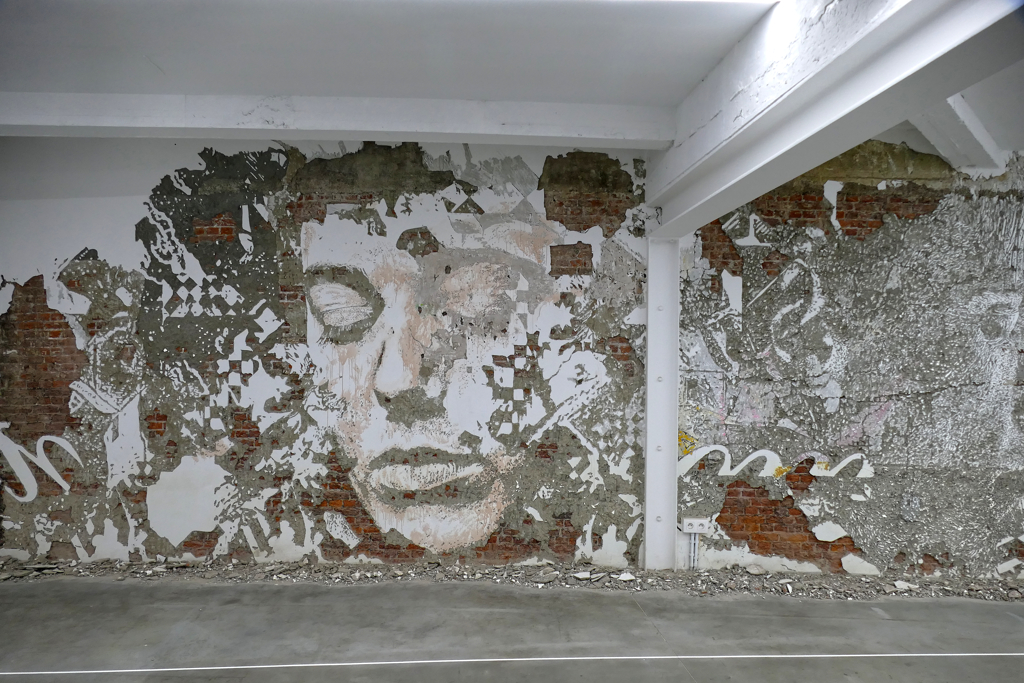
Until January 2025, VHILS’ magnificent exhibition Multitude took place at the Millennium Iconoclast Museum of Art MIMA in Brussels.
Jef Aérosol
Stenciling is becoming increasingly popular among street artists. Jef Aérosol, who was born in Nantes in 1957, is considered one of the pioneers of this technology.
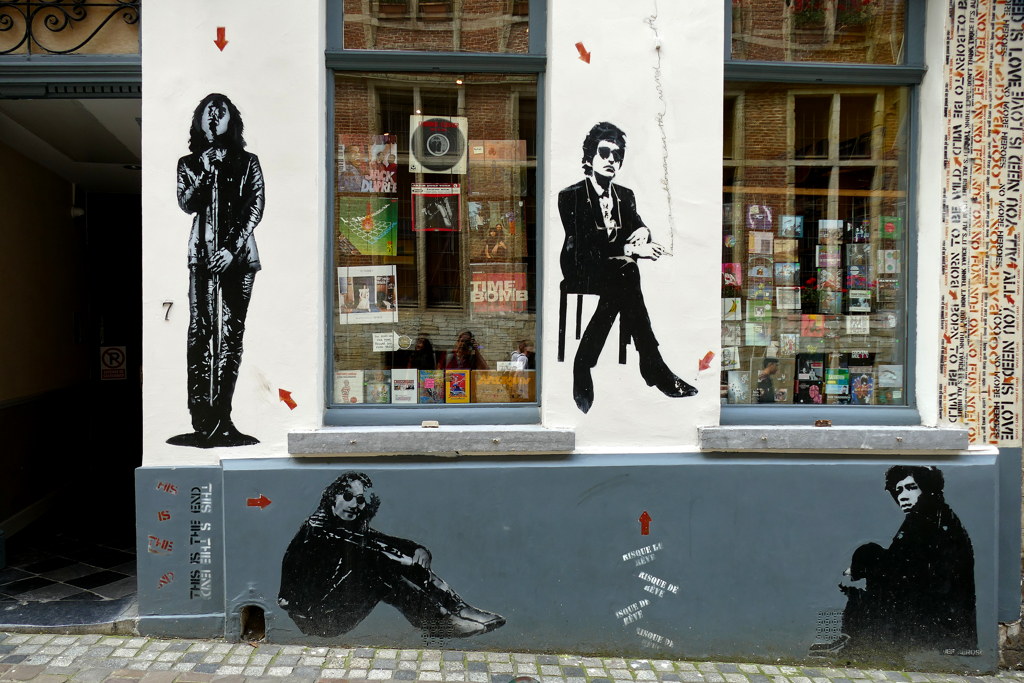
In his works, he mainly portrays famous personalities such as Gandhi, John Lennon, Jimi Hendrix, and Audrey Hepburn. In addition, he also shows ordinary people he saw on the street.
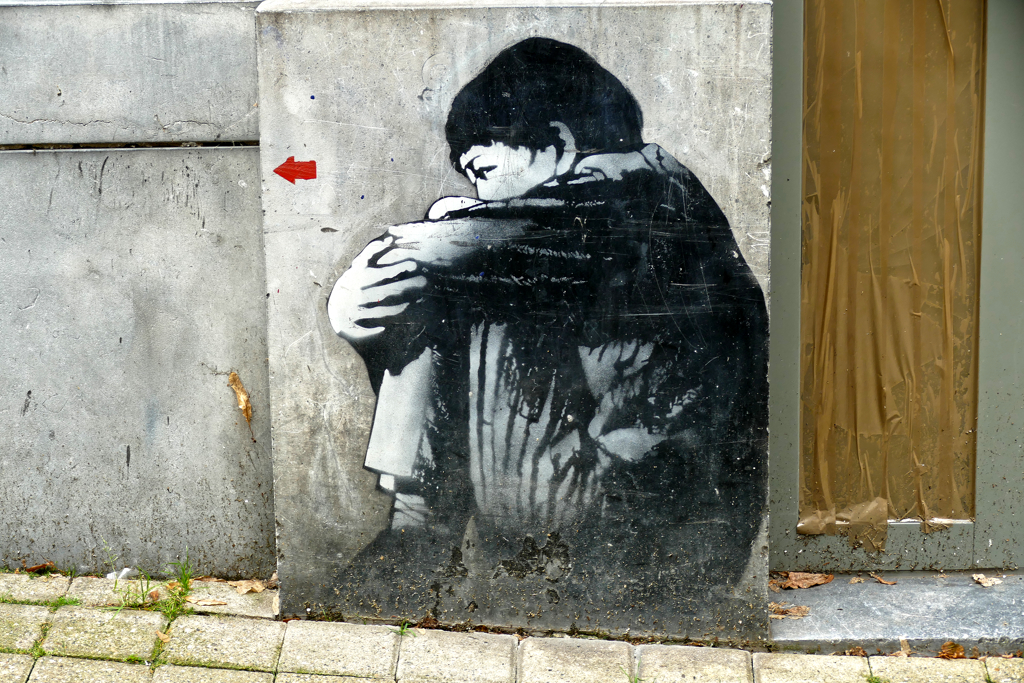
From Nantes to the Great Wall of China, Aérosols stencils can be found in many places, and they come in multiple shapes and sizes. Yet, his iconic portraits can also be seen in numerous exhibitions, festivals, and contemporary art fairs.
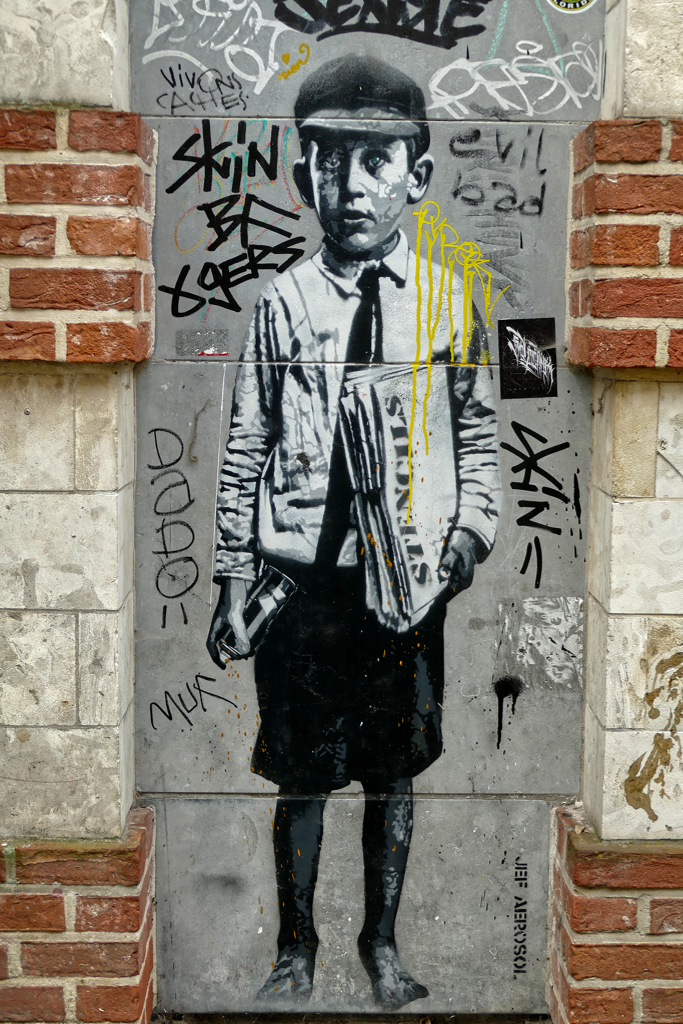
Jef Aérosol marks his stencils absolutely unmistakable with a red arrow. It first appeared in the mid-1980s and is essentially Jef Aérosol’s second signature.
I introduced another huge work by Jef Aérosol in my post PARIS for Free!
HMI
Fouad Hachmi aka HMI is a Brussels-based artist with a wide range of skills: he is a painter, cartoonist, and graffiti artist. He is a member of the hip-hop collective CNN199, which has been active for almost 25 years and is considered one of the most talented graffiti artists in Belgium.
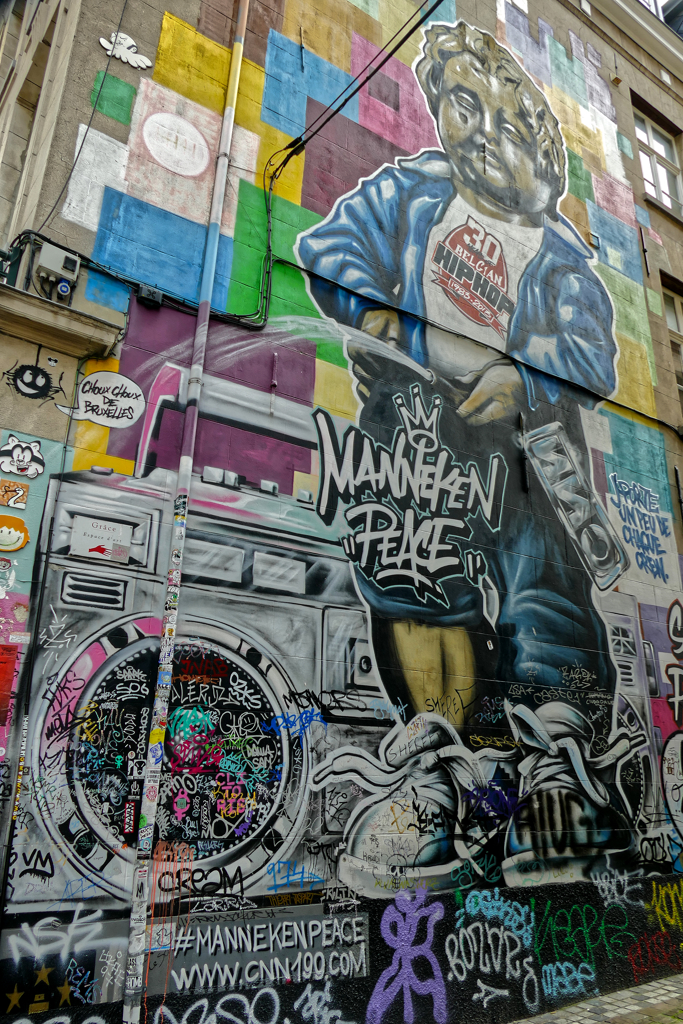
The artist’s work naturally became known beyond the country’s borders. In addition to Belgium, he has also left his artistic traces in Dakar, Dubai, Milan, Meknes, New York, and Paris.
BONOM
Vincent Glowinski aka BONOM is active in many artistic areas. He has demonstrated his craftsmanship skills, particularly when dealing with parchment leather. Born in Paris, he moved to Brussels in the early 2000s to study fine arts at La Cambre.
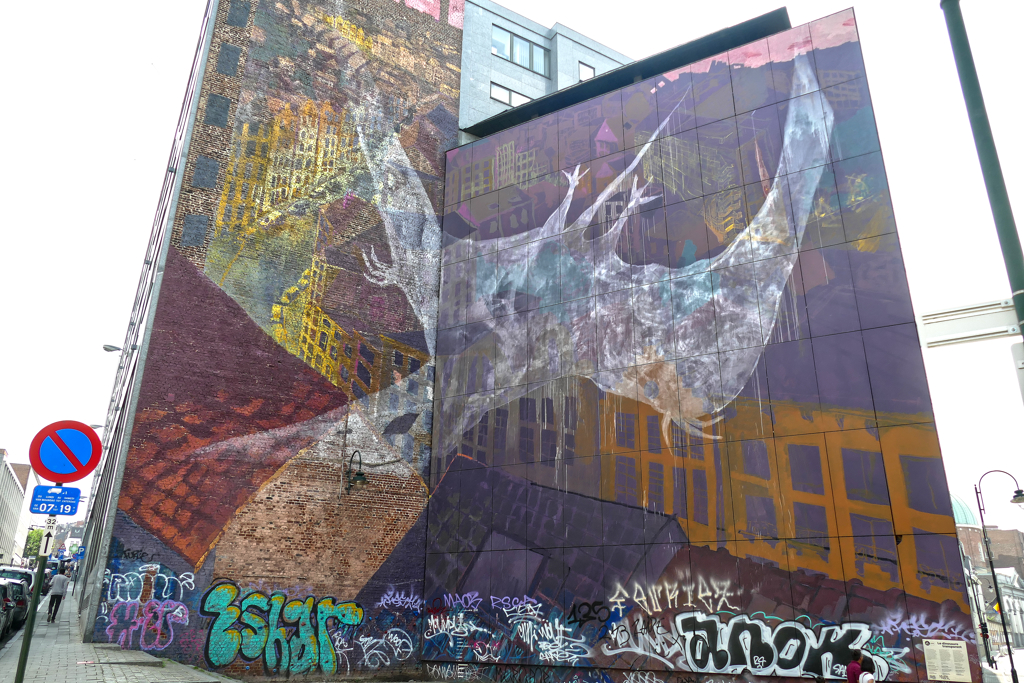
Today he divides his time between his hometown and his adopted home. He also reproduces his oversized urban works on canvas, photo paper, and leather for gallery exhibitions.
Mr Doodle
Sam Cox aka Mr Doodle is a British street artist best known for his striking, doodle-like drawings. His doodles consist of countless repeating patterns and figures, often reminiscent of comic book elements, that span entire walls, pieces of furniture, clothing, and even buildings.
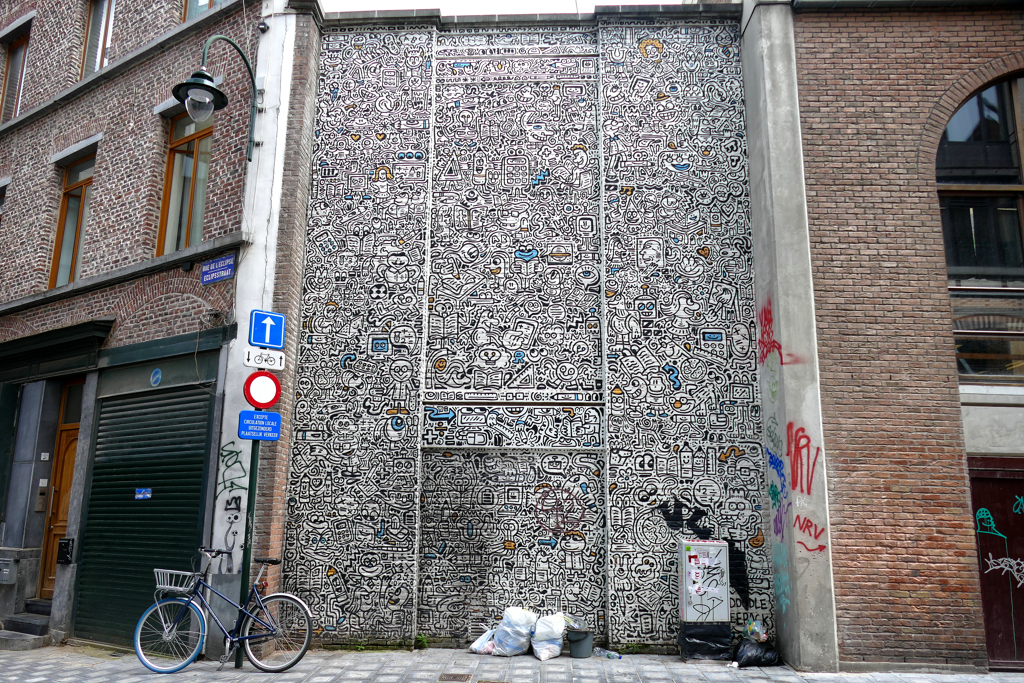
Mr Doodle quickly gained international attention by sharing his work on social media and presenting it in various urban spaces and galleries. His style, which he describes as Graffiti Spaghetti, is not only playful and entertaining, but also extremely detailed and complex.
Mr Doodle has left his mark not only on the street art scene, but also in the fashion and design world. He has collaborated with various brands and designers to showcase his art in clothing, accessories, and everyday items.
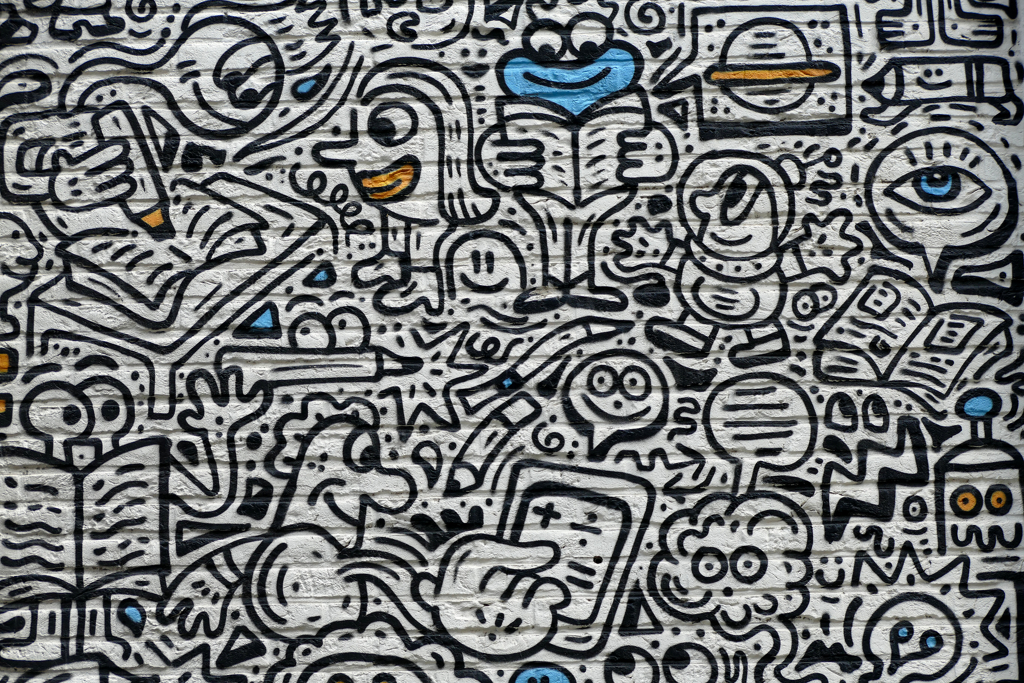
He is considered one of the most up-and-coming street artists. His works are a mix of pop art, surrealism, and urban art, which have a strong visual identity and often appear humorous and energetic.
MISS CHELOVE
Cita Sadeli aka MISS CHELOVE is an illustrator, designer, art director, and muralist. She co-founded the arts and interactive agency Protein Media in Washington DC, where she is still based today.
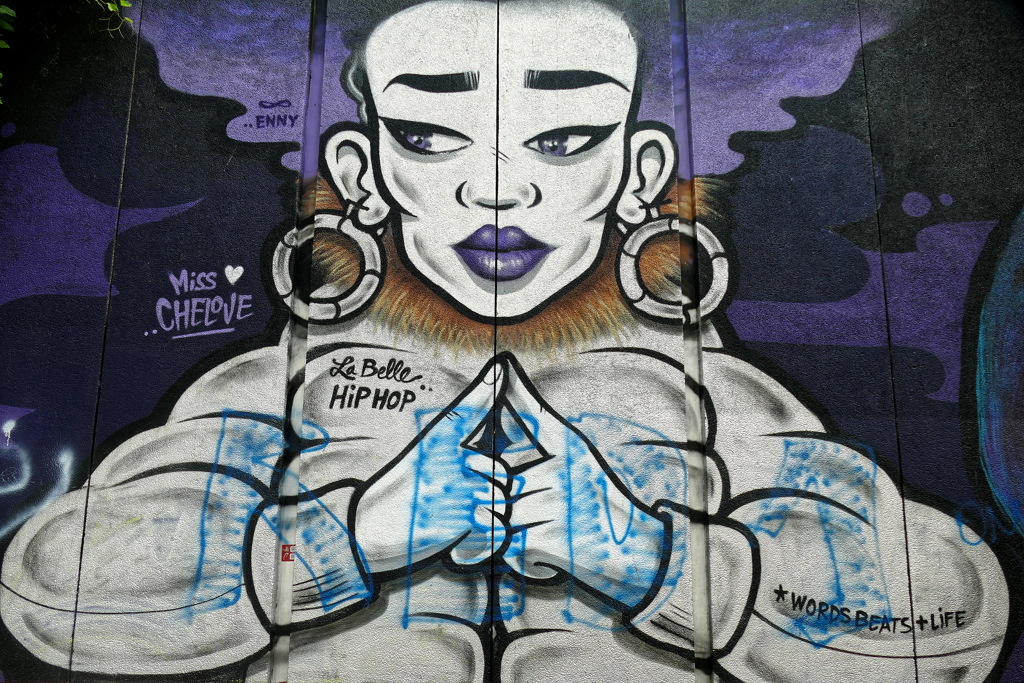
MISS CHELOVE was largely influenced by her Indonesian origins, but also by the punk and graffiti of the 80s and 90s.
Currently, MISS CHELOVE creates murals all over the world. In her works in bold colors, she celebrates different cultures and often self-confident, independent women. She also works creatively for and with communities and various companies.
LaetiCNN199
LaetiCNN199 comes from the French city of Chamonix. The self-taught artist is not only one of Europe’s best-known female street artists, she also lives out her creative energy as a singer and author.
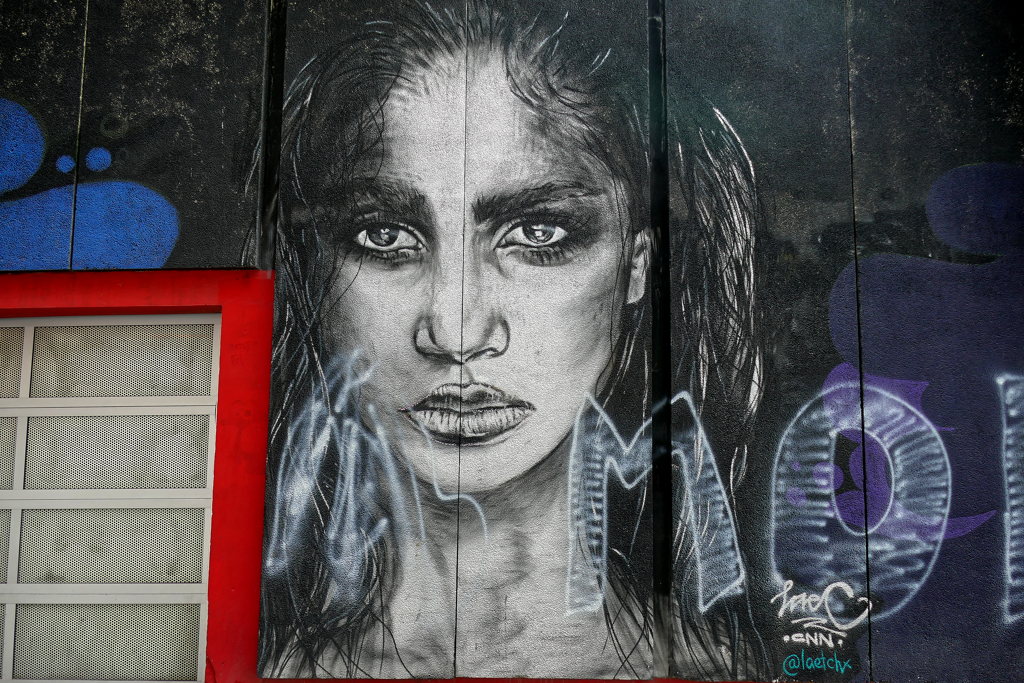
LaetiCNN199 is a member of the Belgian street art crew CNN199 and the all-female crew La Belle Hip Hop.
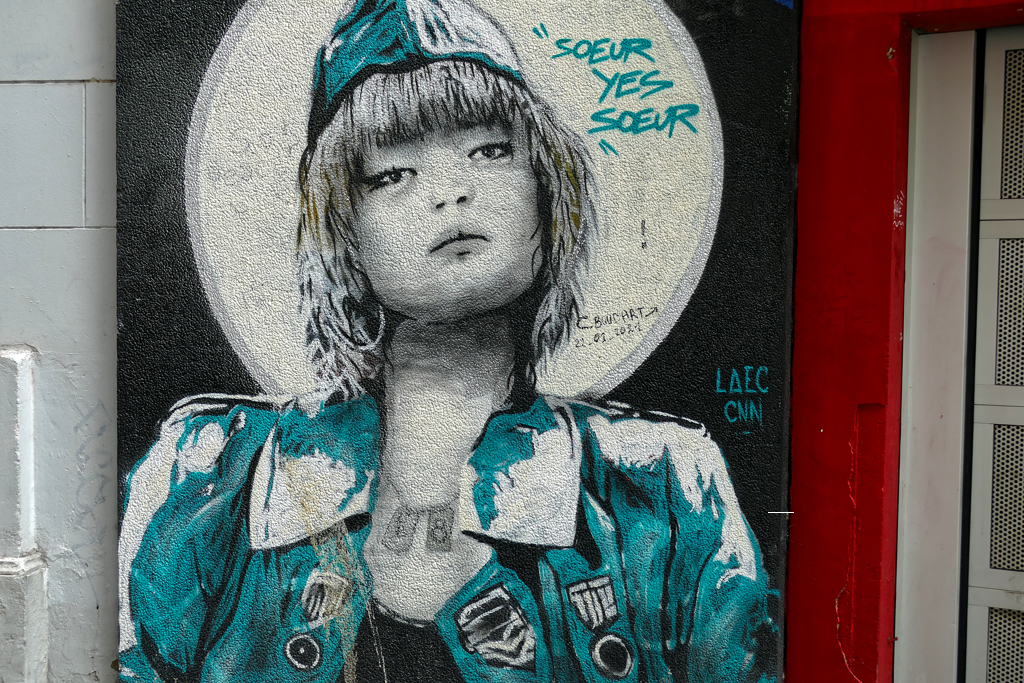
Through her participation in many international street art festivals, she has been able to experience new cultures while traveling and exchange ideas with a number of other artists.
DEMA
Ahmed Ahamdi aka Dema has been combining Arabic calligraphy with graffiti for over 30 years.
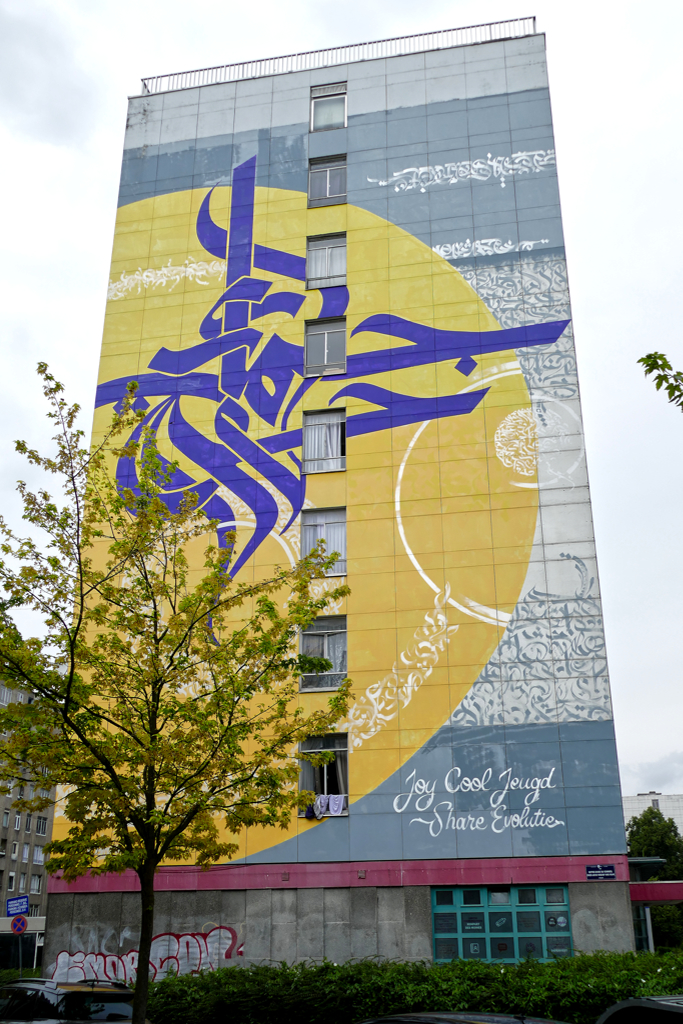
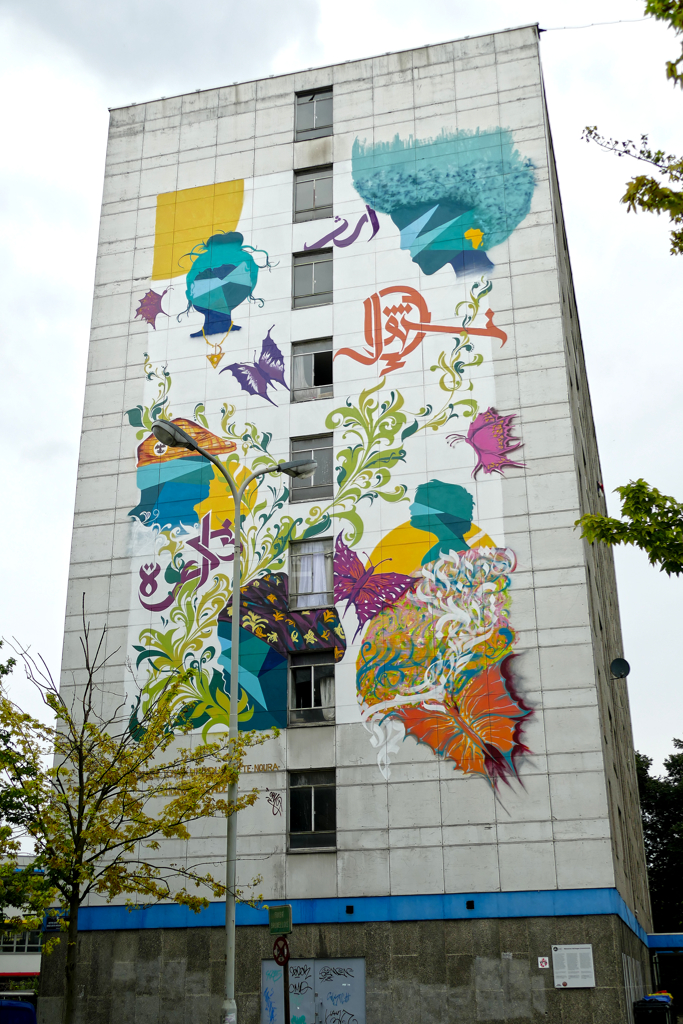
In his works, he gives traditional art a contemporary urban twist. His works are often created in collaboration with citizens, clubs, and institutions, because his philosophy is to democratize urban art. He is the driving force behind numerous urban art projects and an indispensable part of the Belgian street art scene.
With his background and extensive experience in the field of art projects, he inspires young people to make their voices heard in public spaces where they are all too often underrepresented.
Ledia Kostandini
The Albanian artist Ledia Kostandini lives and works in Tirana. In her artistic work, she deals with social changes and traditional or lost cultures in her homeland.
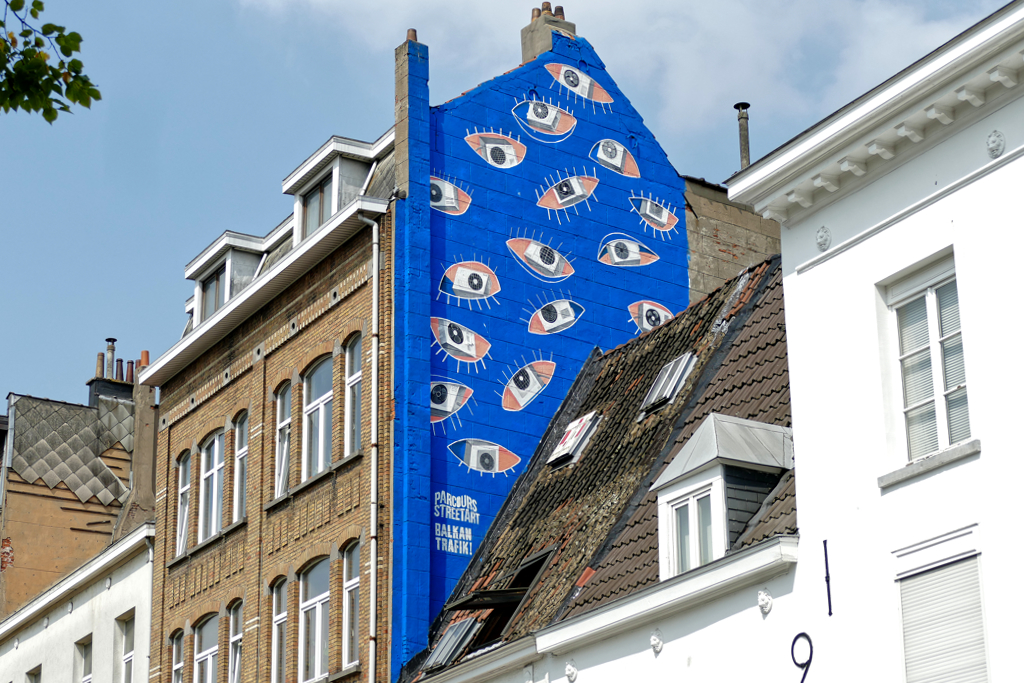
For the artist, unusual architectural forms are a special challenge, which she addresses with a wide range of design solutions.
Her artistic practice encompasses many media such as photography, painting, illustration, and installation.
ojoMAGico
The Croatian artist Jadranka Lacković aka ojoMAGico graduated from the Academy of Fine Arts in Rijeka. She is co-founder and director of ArtMašina, a creative studio for informal learning of art techniques and promoting visual culture in everyday life.
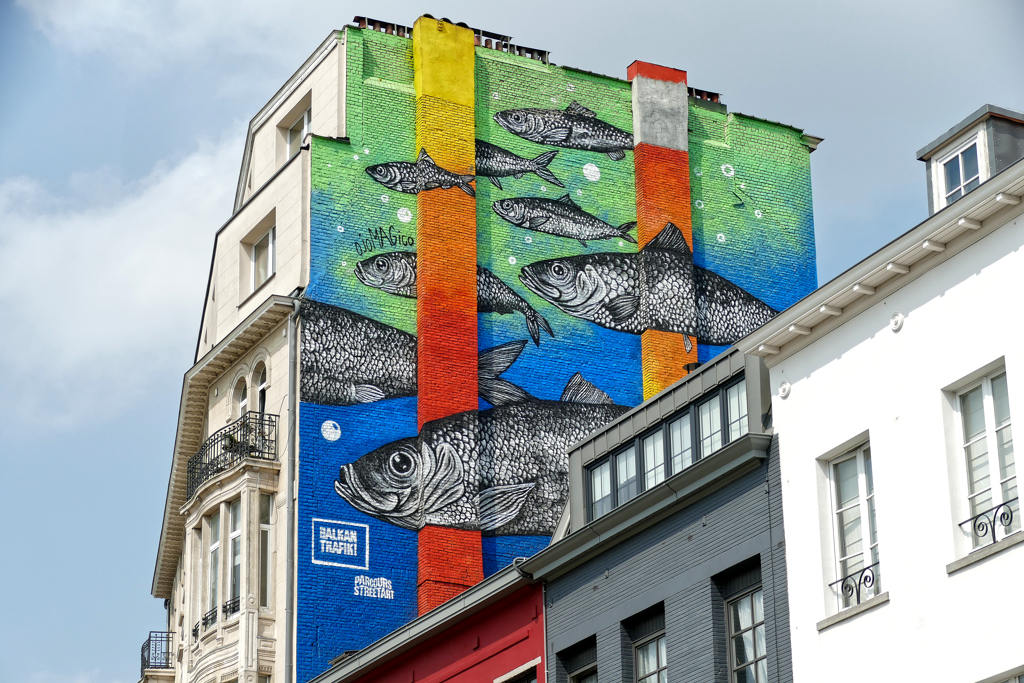
Fish are her favorite motif because they know no borders and symbolize freedom.
Alba Fabre Sacristán
Alba Fabre Sacristán is a Spanish muralist. After studying at the Barcelona Art Academy, she developed her works in her studio together with other artists.
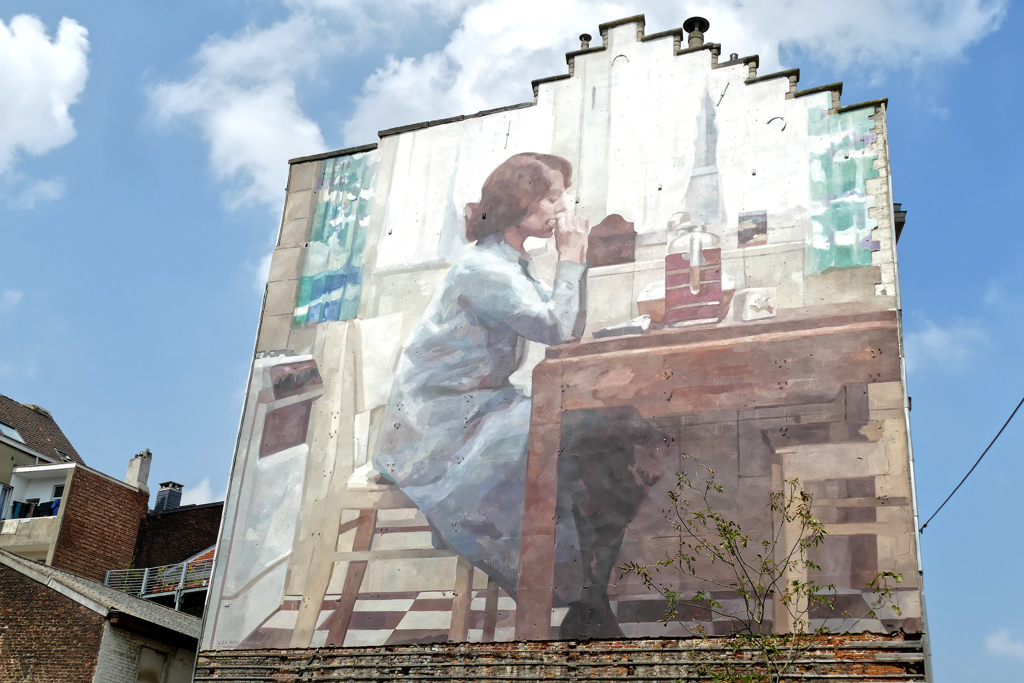
She is interested in the expressiveness of classical art, which is reflected in her paintings. Her work is characterized by a figurative style that is often very close to impressionism.
Alba Fabre Sacristán is also a drawing lecturer in Barcelona.
La Dame Quicolle
Julie aka La Dame Quicolle is known for her so-called Street Guardians. On sidewalks, subways, and other urban spaces, women must reclaim their spaces in the face of sexualized threats and violence.
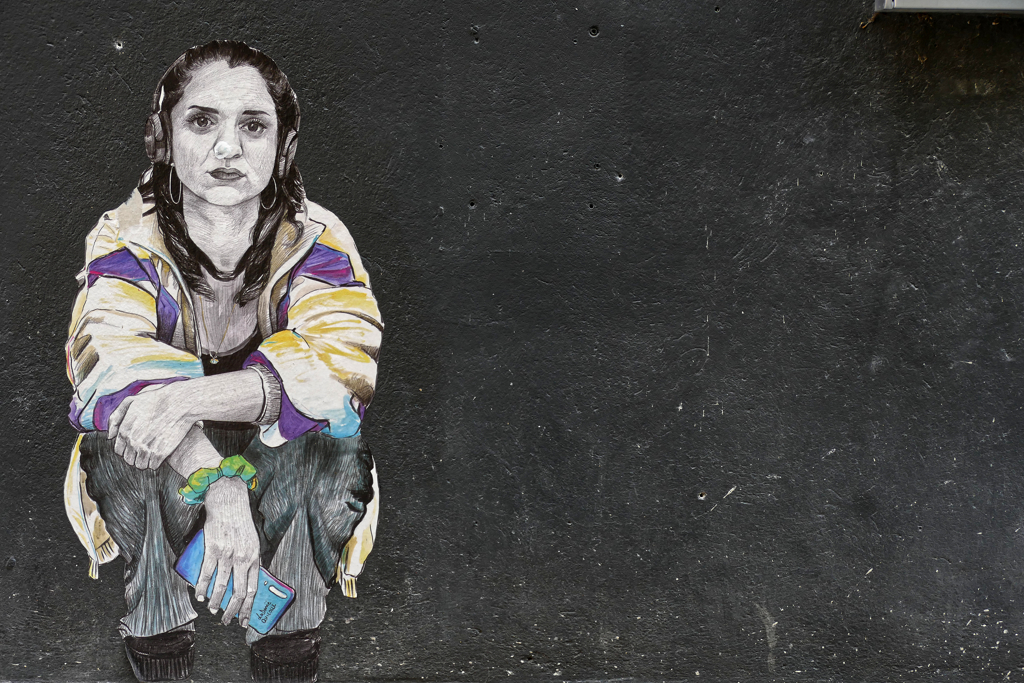
La Dame Quicolle’s stenciled women stand, sit, or squat on the walls of cities, looking toward us or staring into the distance. The models themselves choose the pose in which La Dame Quicolle then portrays them.
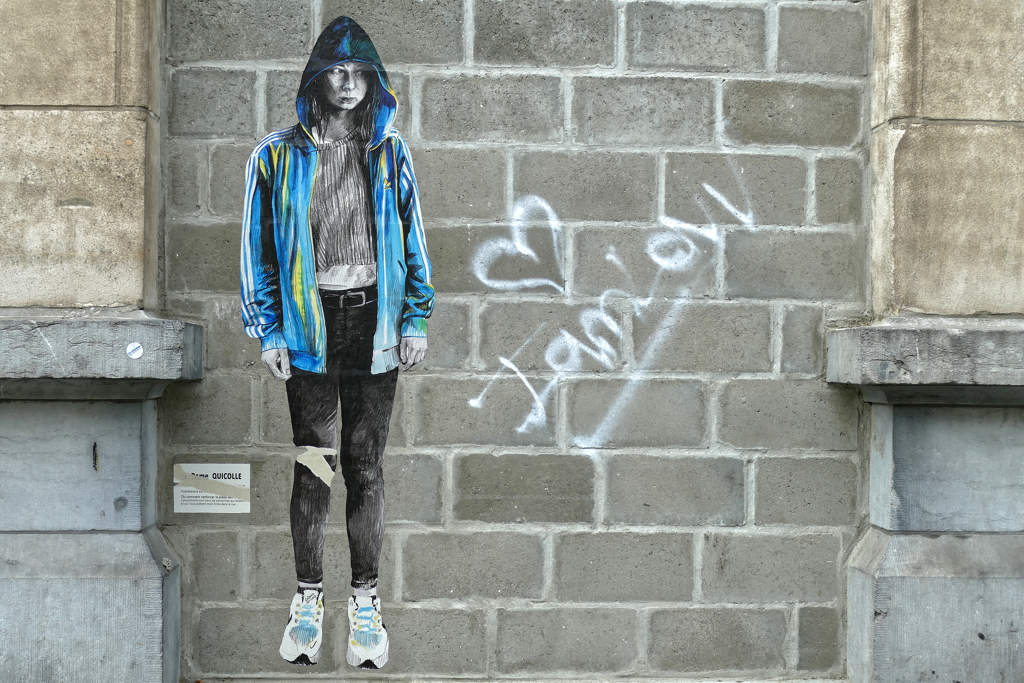
Bruce Clarke
Bruce Clarke was born in London but moved to Paris after studying art.
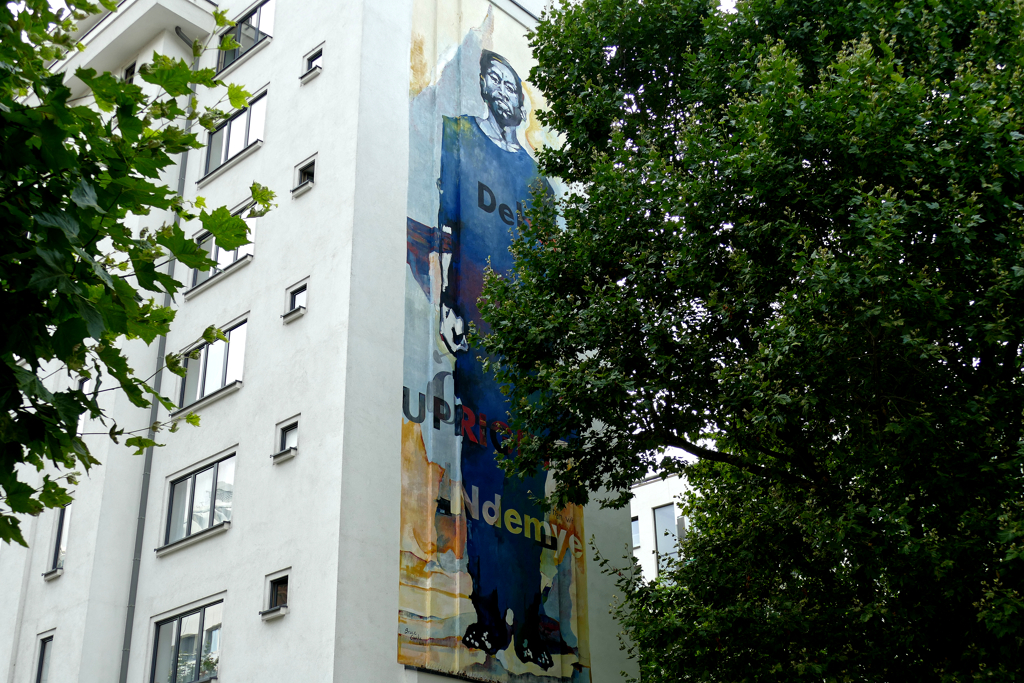
Because his family lived in South Africa for a time, he had a strong connection to the African continent from a young age. Therefore, his creative work deals with topics such as slavery, colonialism, and globalization. For Clarke, art is a privileged means of commenting rather than being purely decorative.
Mona Tusz
Mona Tusz is a Polish artist who has been active in the field of street art since 2007. In 2008, she completed her master’s degree at the Academy of Fine Arts in Katowice.
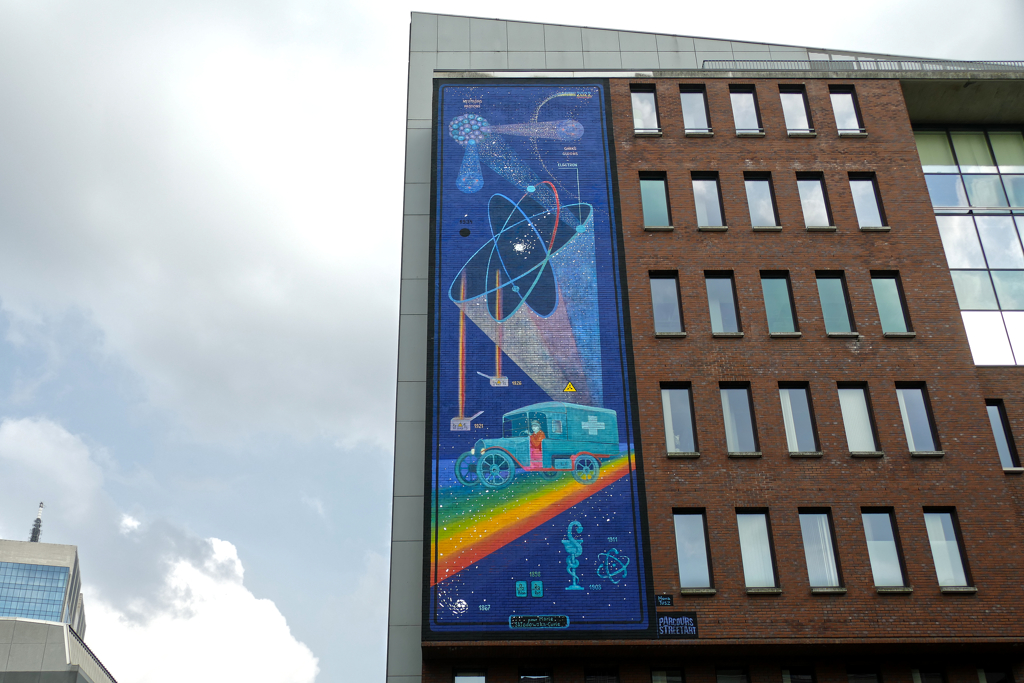
She has created around 100 murals and taken part in numerous street art festivals. She has offered street art and artistic workshops for various socially excluded population groups. In 2019, the mayor of Katowice presented her with a prize for extraordinary, poetic murals and social activities.
In addition to large format and easel painting, Mona Tusz also creates installations and sculptures, graphics, and photos.
SAINER
Przemysław Blejzyk aka SAINER was born in 1988 in Łódź, where he completed his studies at the Academy of Fine Arts. Today, he lives and works in Gdynia.
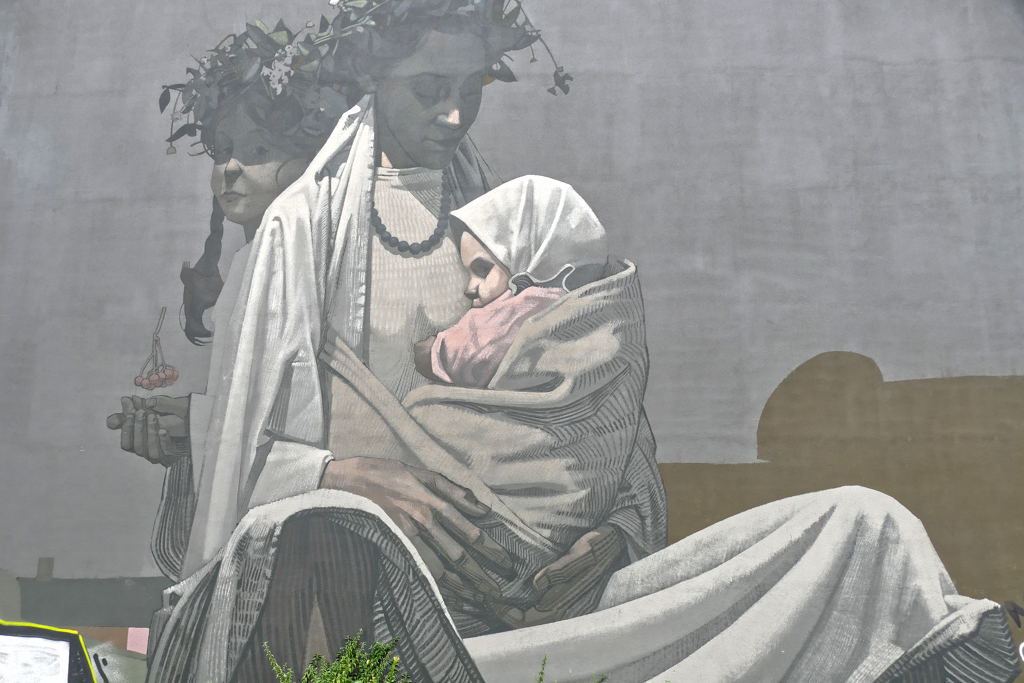
As one half of the artist duo ETAM CRU, he has made a name for himself as a highly accomplished street artist. His partner in crime art is BEZT aka Mateusz Gapski. Together, they are one of the most sought-after mural painting duos. In recent years, they have designed countless large-scale murals and participated in various street art festivals and exhibitions in Europe and the USA.
In their predominantly figurative works, ETAM CRU combines realism with fantasy. Her works are strongly influenced by the artistic tradition of the Impressionists and Fauvists.
I’ve introduced SAINER as part of the artist duo ETAM CRU in my post Best Street Art in VIENNA.
SHIRO
Shiro is a renowned street artist from Japan, known for her vibrant and playful style that combines graffiti with manga-inspired characters. Originally from the Japanese city of Shizuoka, Shiro began her journey into street art in the late 1990s and has since gained international recognition for her distinctive works. Shiro has painted murals and participated in street art projects around the world.
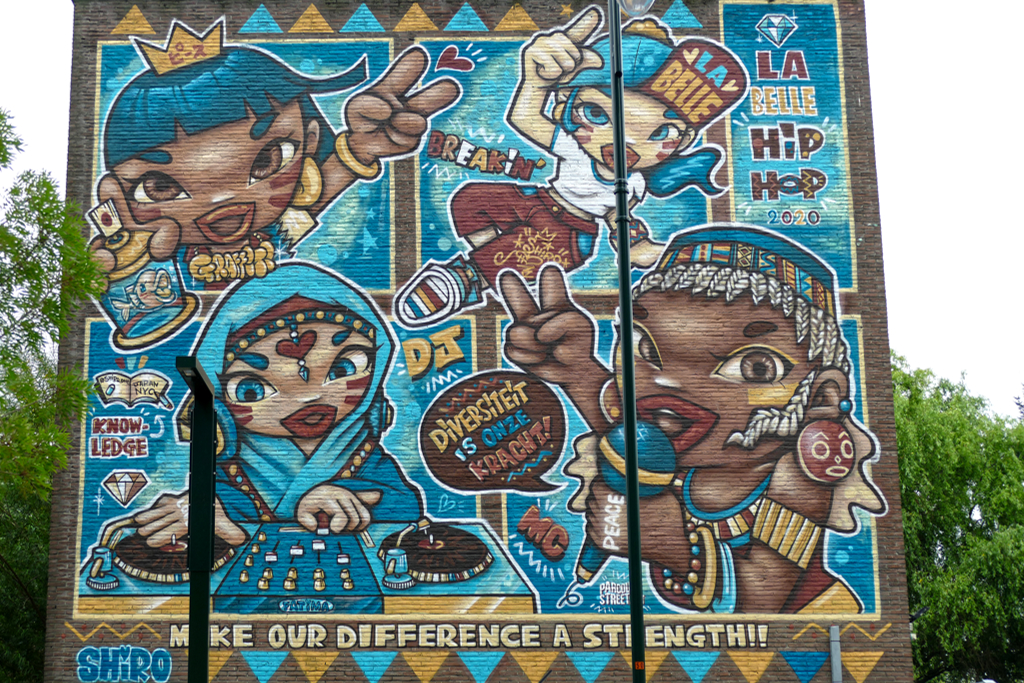
Her art often features strong, dynamic female characters and reflects themes of empowerment, positivity, and cultural fusion. Bold colors, exaggerated facial expressions, and intricate details characterize Shiro’s work. Her characters often wear traditional Japanese clothing mixed with urban streetwear, combining cultural heritage with contemporary street culture.
Shiro has collaborated with other well-known street artists and has been featured in various exhibitions. Her work not only adorns public spaces but also includes canvases and commercial projects, highlighting her versatility as an artist.
Anthea Missy
French street artist Anthea Missy now lives in Brussels. She is known for her uplifting and positive messages, and her work often includes vibrant, large-scale murals that are both visually striking and thematically appealing. Anthea Missy’s art is characterized by a focus on love, freedom, and empowerment, often using bright colors and bold, flowing lines.
Her work often features whimsical characters and symbolic motifs that convey messages of hope, unity, and positivity. Her goal is to create art that touches audiences on an emotional level.
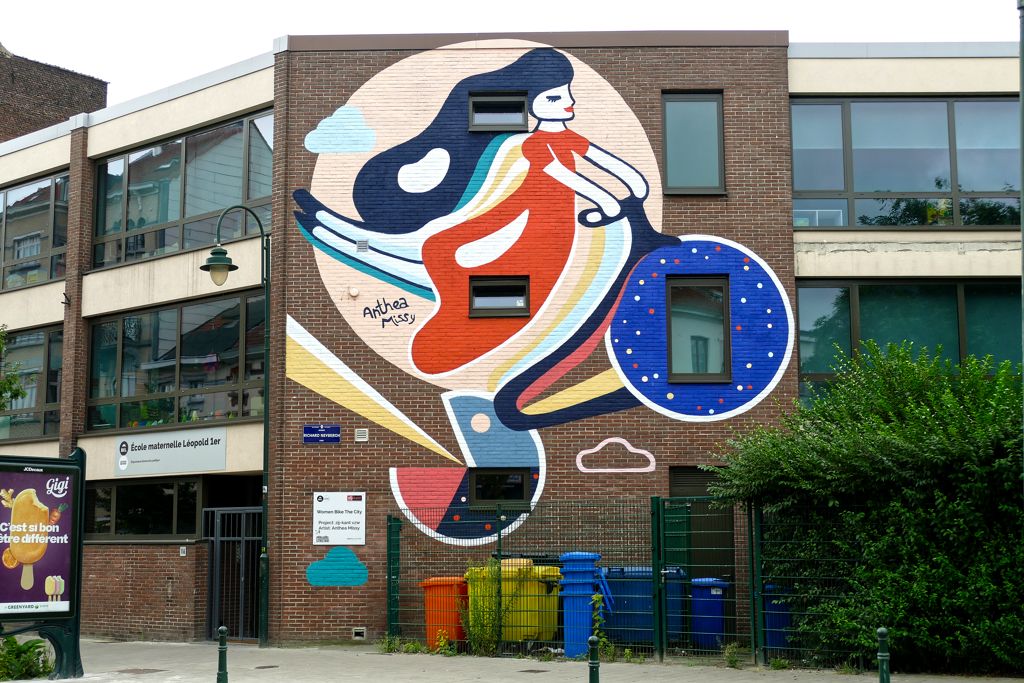
Today, Anthea Missy’s murals can be found in various cities around the world, including Brussels, London, and Tokyo. Her work has been featured at numerous street art festivals and exhibitions, making her a well-known figure in the international street art community.
Beyond her artistic work, Anthea Missy is also involved in activism and uses her art to promote social causes. She has been involved in projects advocating for women’s rights, mental health awareness, and environmental sustainability, using her platform to raise awareness and inspire change.
FSTN
Pierre Coubeau aka FSTN, which is pronounced Fiston, drew from a very young age. He later studied illustration at the Saint Luc Tournai art school.
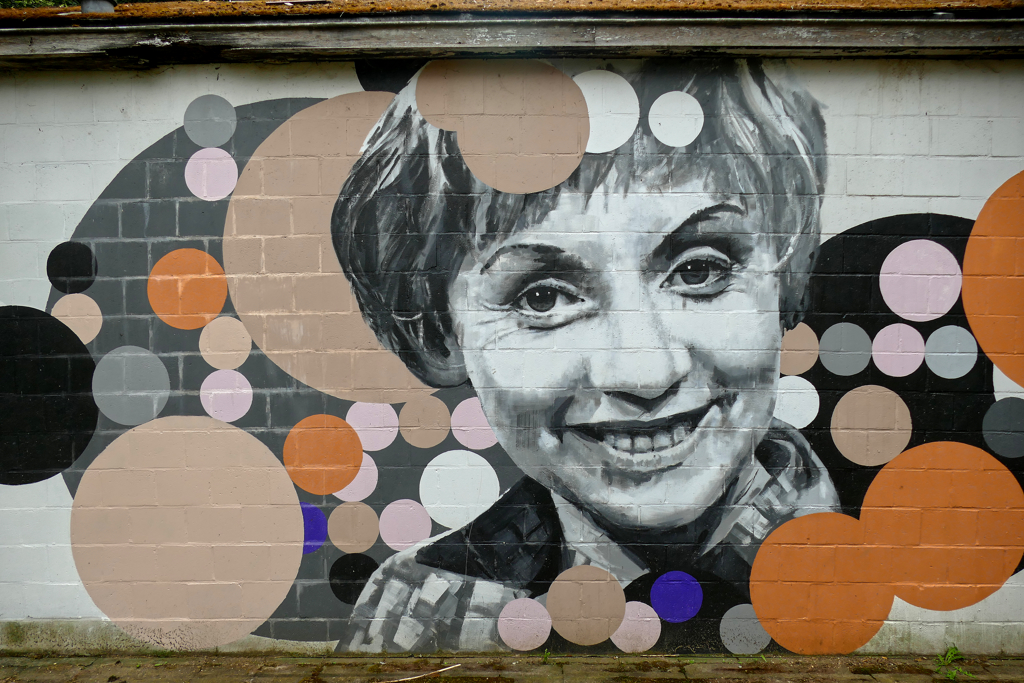
Interestingly, his favorite tool is the ballpoint pen, which he is incredibly skilled and precise at using. It is an essential element that shapes his style and his work. In the field of street art, his trademark is hyperrealistic portraits in black and white.
NEAN
Fabien Hupin aka NEAN is a prominent street artist from Brussels. The self-taught artist, born in 1991, made his first artistic attempts on paper. Later, he resorted to spray paint. Today, NEAN is known for his highly detailed, figurative works that combine traditional painting influences with modern techniques. He often combines this with a photorealistic style. His works are often thought-provoking and encourage viewers to find their own interpretations and connections.
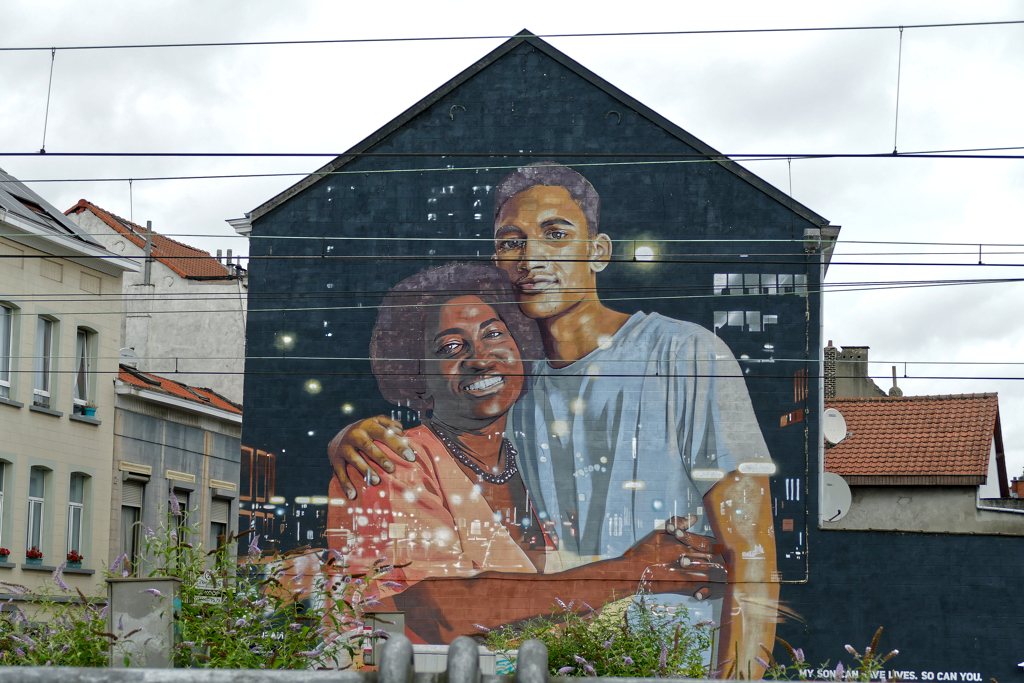
His art is characterized by meticulous attention to light and color. As a result, he creates poetic, almost melancholic works. NEAN is inspired by European Art Nouveau artists such as Gustave Klimt, Egon Schiele, and Alphonse Mucha. He combines tradition with contemporary street art techniques. In addition to his murals, NEAN participates in art projects and festivals.
I’ve also introduced NEAN’s murals in my post on Best Street Art in Nîmes.
Jana Danilović
Jana Danilović was born in the Serbian city of Užice. She studied at the Faculty of Fine Arts in Belgrade where she developed her distinctive style that combines traditional artistic techniques with contemporary urban expression.
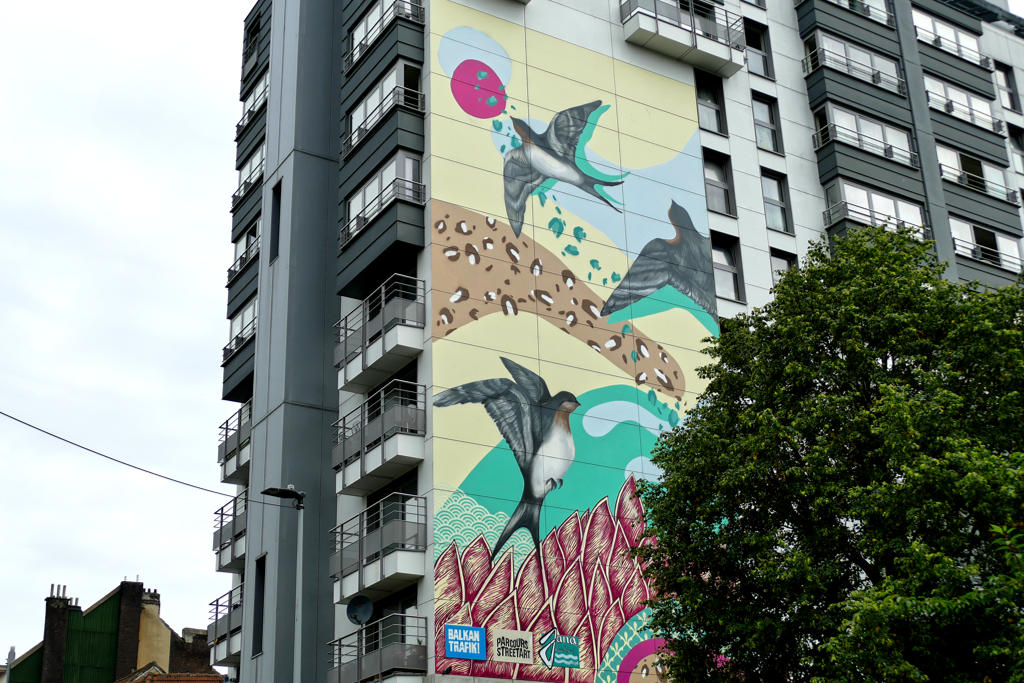
Danilović is known for her detailed work. Her murals typically feature intricate linework and often depict complex, symbolic narratives. Her art often touches on philosophical and existential themes, reflecting human nature, societal issues, and personal introspection. By incorporating elements from folklore, mythology, and surrealism, she creates a complex web of visual narratives.
Jana Danilović’s work can be seen on walls in Belgrade, Sarajevo, and beyond. She has participated in numerous street art festivals and exhibitions across Europe.
As one of the prominent figures in the Serbian street art scene, Jana Danilović has played a key role in increasing the visibility and appreciation of street art in the region. Her work challenges traditional notions of urban art, combining art techniques with the raw, expressive power of graffiti and murals.
I’ve introduced another mural by Jana Danilović in my post LJUBLJANA Mon Amour: What Not to Miss During Two Days in Slovenia’s Beloved Capital.
Piotr Szlachta
Piotr Szlachta was born in Poland. He came to Belgium in the 1980s, where he initially studied archeology and art history. He later graduated in illustration from the renowned art school Saint Luc in Tournai and founded his own graphic design company.
In 2012 he joined the street art crew Farm Prod and beautified walls in Brussels and beyond.
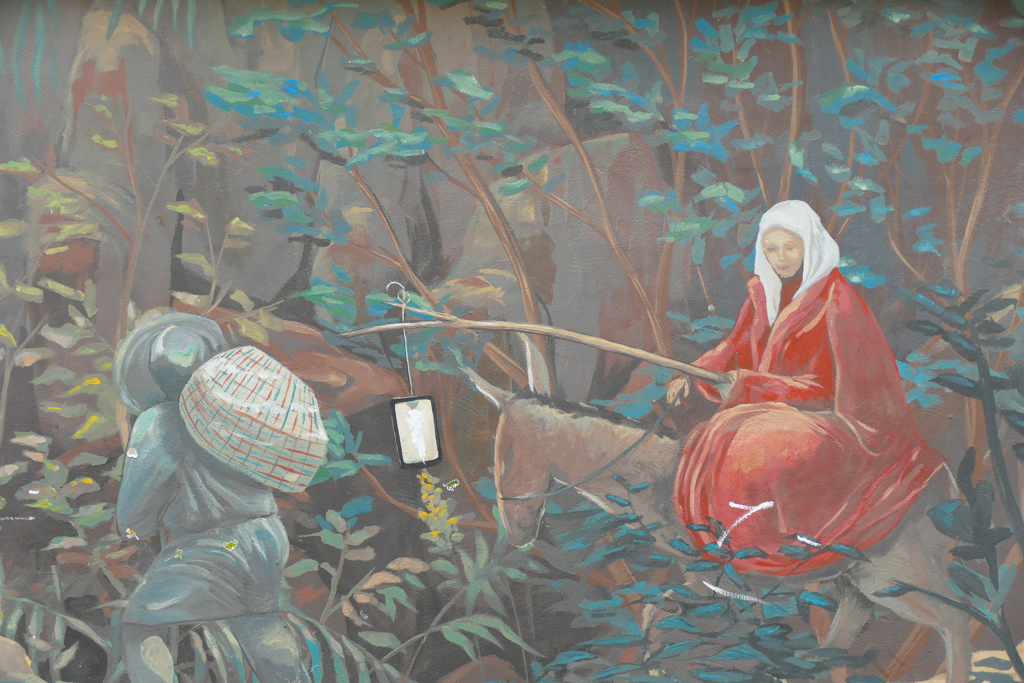
In 2019, Piotr Szlachta was one of the ten artists commissioned to reinterpret his masterpieces in the form of murals on the occasion of the 450th anniversary of the death of the legendary painter Pieter Bruegel the Elder. This is how the Bruegel course was created in the Marolles district.
Alexis Corrand
Alexis Corrand contributed another one of the ten homages to Peter Bruegel the Elder.
Corrand was born in Paris in 1977. He showed an extraordinary talent for drawing at an early age. Through various training courses and, above all, as an autodidact, he has acquired extensive skills in the areas of design and digital technology. Thanks to his aunt, the artist Charlotte Derain, Alexis Corrand found access to a variety of techniques. Ultimately, he decided to immerse himself in the world of graffiti and join the French graffiti team MACrew in Paris.
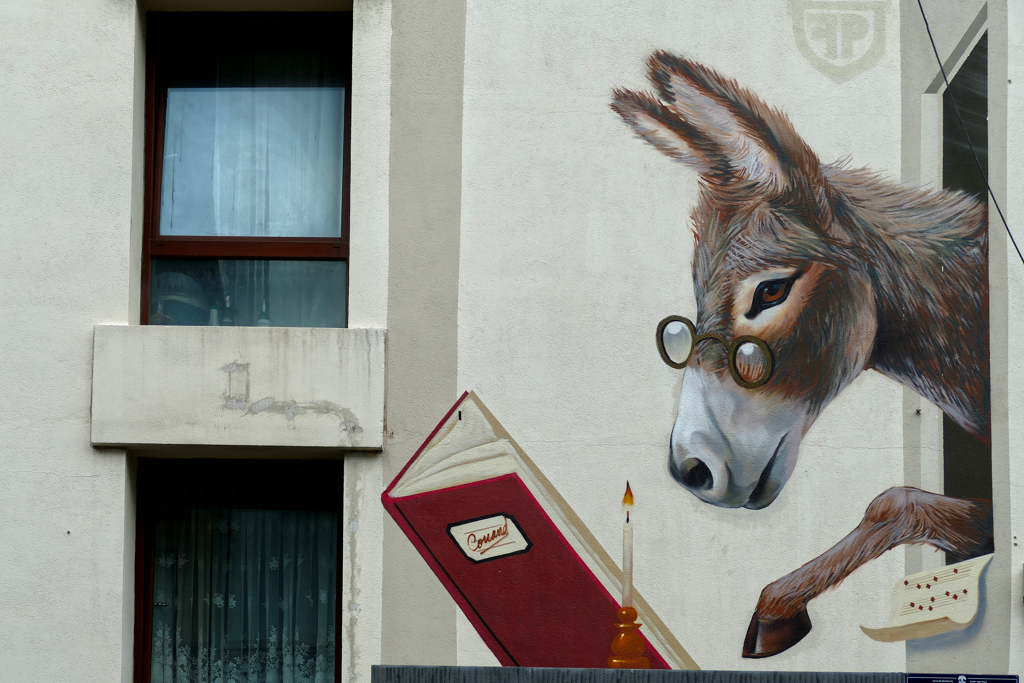
At the end of 2010, Corrand moved to Brussels. Here, he joined the Farm Prod crew and quickly made a name for himself as a portrait painter thanks to his exceptional talent. His insatiable thirst for knowledge, his open glance at people, and his interest in the unfamiliar support him in his creativity.
Arno 2bal
Arnaud Debal aka Arno 2bal was born in the Belgian city of Tournai. There, he completed his studies as a painter and illustrator at the renowned art school Saint Luc.
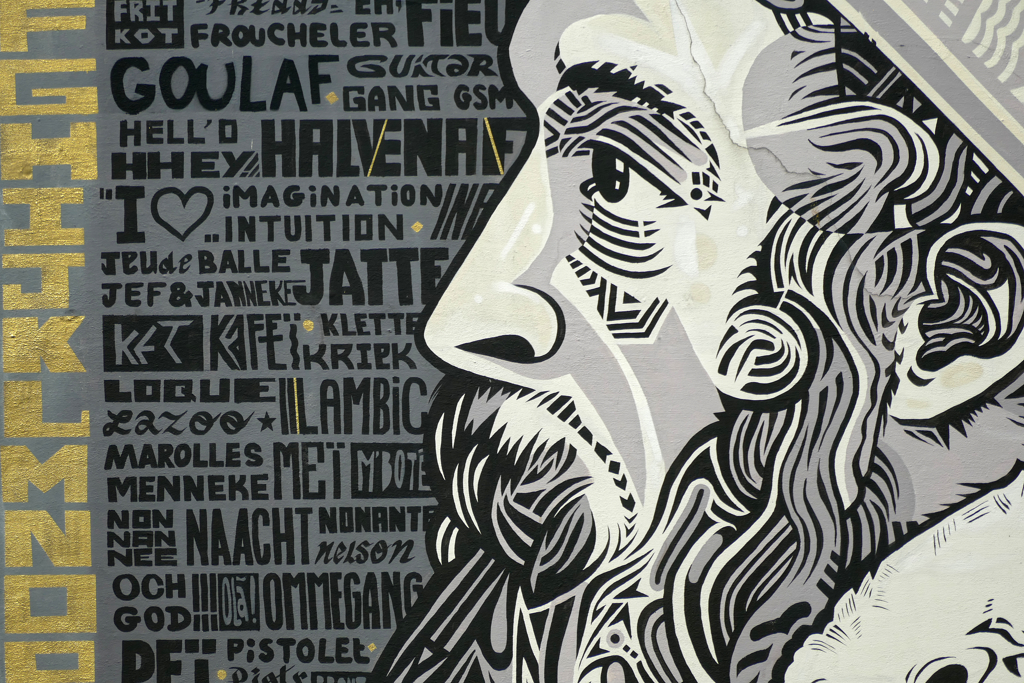
Arno 2bal has worked on a variety of creative and artistic projects. His time in Kinshasa particularly influenced him artistically.
After his return, he settled in Brussels, where he developed his creations on different scales, from small formats to monumental frescoes. He is part of the Brussels collective Farm Prod.
Between 2017 and 2020, he developed a series of black-and-white works, returning to the artistic roots of drawing and graphic prints.
Nô
Arnaud Rabier aka Nô was born in a Parisian suburb in 1981. After receiving his master’s degree in 2005, he initially taught foreign languages and social sciences before backpacking around the world for a long time. He sketched hundreds of portraits of the people he met on his journey.

Then, when he returned to France in 2018, he developed a stenciling technique that allows him to create countless faces on the walls of cities. Nô mostly portrays children who are on the dark side of life.
I’ve introduced various of Nô’s portraits in my posts Best Street Art in Marseille as well as Best Street Art in Bordeaux.
Sestry Feldman – Teresa Sdralevich
Sestry Feldman, which translates to Feldman sisters, are Michelle and Nicole Feldman. In addition to family ties, the artists from Dnipro have also been active as an artist crew in Kyiv since 2014.
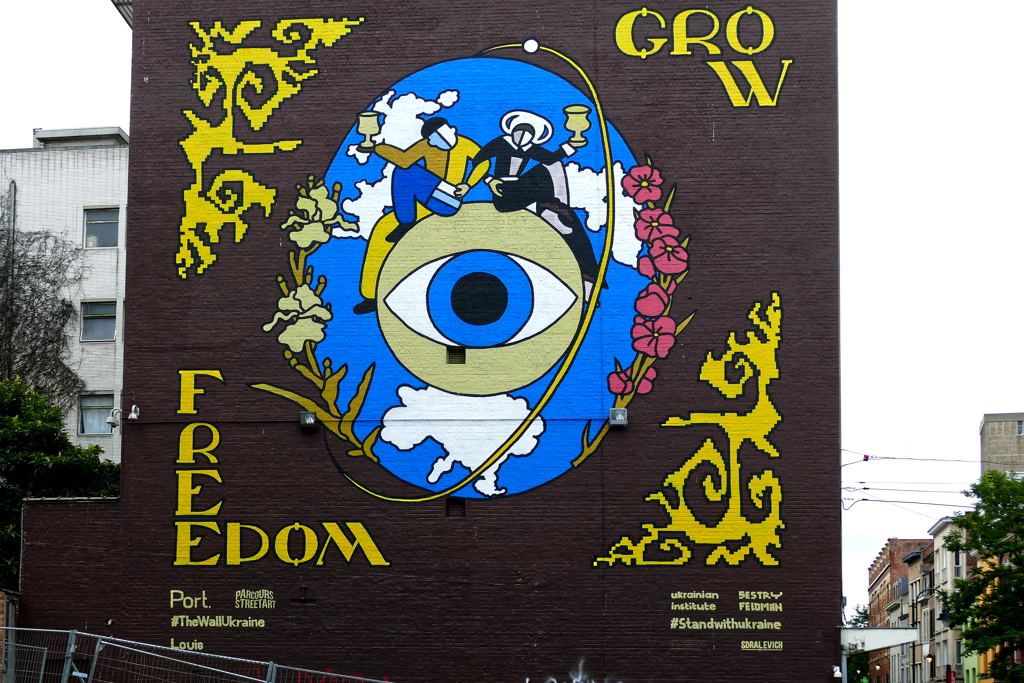
Sestry Feldman work primarily in urban spaces, but they also create animations, canvases, and merch.
By incorporating folk symbols into their designs in bold colors, Nicole and Michelle created their signature style. In their works, they convey a clear political stance. Their series of patriotic tarot cards is particularly worth mentioning.
They worked with Teresa Sdralevich on her mural in the Morelle neighborhood. Sdralevich was born in Milan and, after completing her master’s degree in political science at the University of Bologna and an internship in Paris, she finally found her calling in Brussels. As an artist, Teresa Sdralevich works exclusively on cultural, political, and social issues and is considered one of the most influential designers in the world.
Céleste Gangolphe – Florianne Mandin – Mathieu Mary
Céleste Gangolphe left a job in the media industry in Paris and now commutes between Lyon, Marseille, and Brussels. In her work, she uses different graphic styles depending on the respective art project. What she likes about working on house facades is that a mural solves several problems depending on the location: it beautifies, informs, and stimulates thought and discussion.
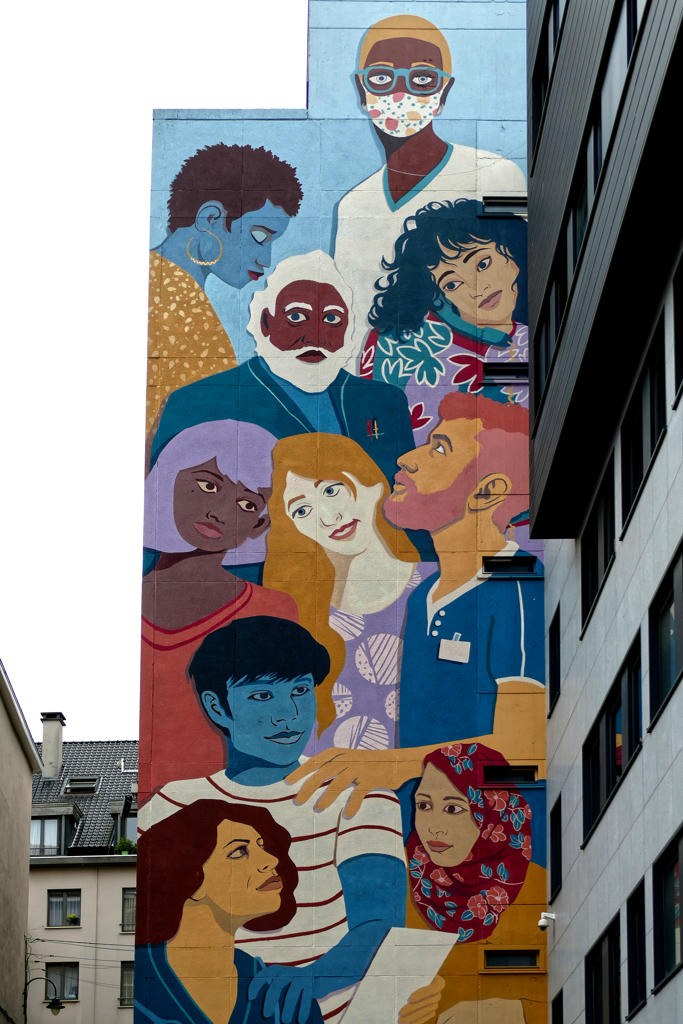
In her work, Céleste Gangolphe deals with important political and social issues such as social inequalities, women’s rights, and LGBTQ+.
Florianne Mandin was born in Lyon in 1987 and was passionate about the fine arts from an early age. Fascinated by the challenges of space, she initially studied landscape architecture before turning to monumental street art. Florianne Mandin is fascinated by the idea that her murals absorb, connect, and reflect the respective wall and its surroundings.
Mathieu Mary was born in Chambray-lès-Tours in 1991 and studied drawing and mural painting in Lyon for four years. His passion is not only painting, but also drawing comics. He always strives to breathe something dreamlike into his artistic works and to lead the viewer into mysterious spheres.
Guillaume Desmarets
Guillaume Desmarets aka Guitar was born in Brussels but spent his youth in a suburb of Paris. Back in Belgium, he also studied art at Saint Luc Tournai before settling permanently in Brussels.
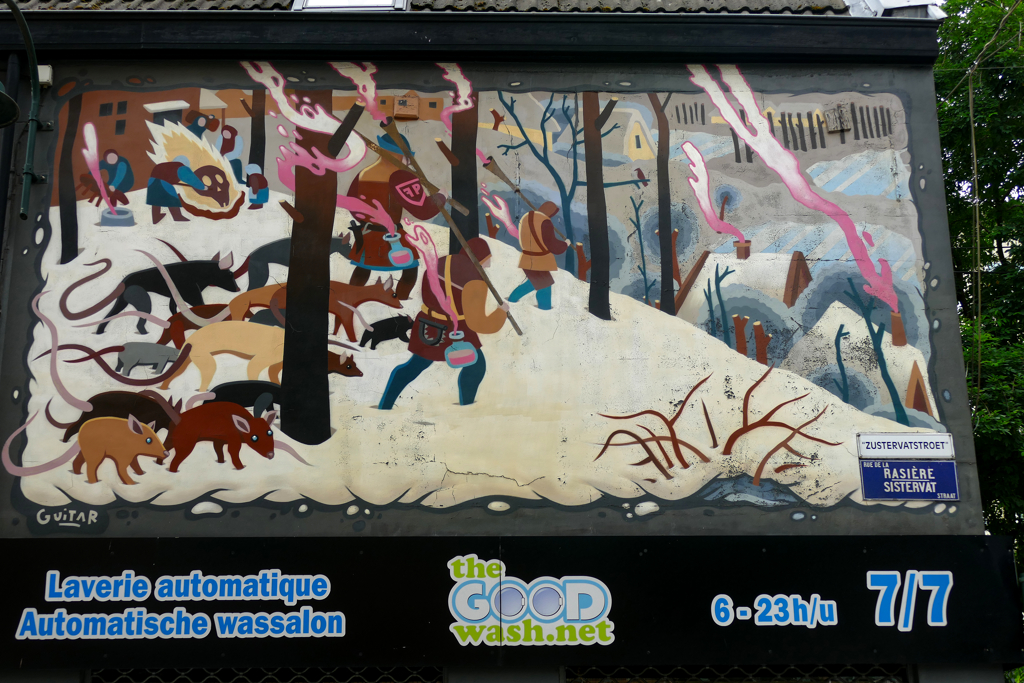
Desmarets’ style is influenced by urban art as well as classical and contemporary painting.
So it made sense to commission Guillaume Desmarets to create a mural on the occasion of the 450th anniversary of the death of the painter Pieter Bruegel the Elder.
Guillaume Desmarets is a member of the artist collective Farm Prod.
MEDIANERAS
MEDIANERAS is an artist duo from Argentina, consisting of architect Vanesa Galdeano and visual artist Aníbal Parada. The duo began working together in 2014, and since then, they have specialized in creating murals, which often feature a mix of geometric shapes, bright colors, and abstract figures. Their artworks are not only visually impressive, but also often carry social and cultural messages that address themes such as identity, urbanity, and community.
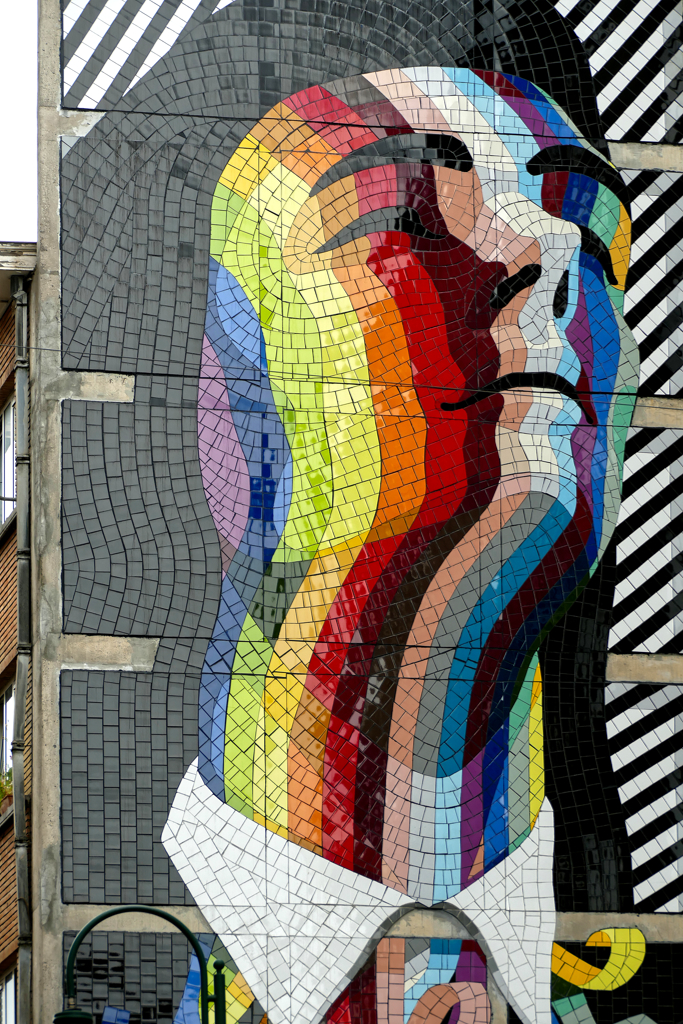
A trademark of MEDIANERAS is their innovative use of perspective and space. They often adapt their work to the specific architecture and environment.
MEDIANERAS ‘ work can be found in various cities around the world, including Buenos Aires, Barcelona, Berlin, and New York. Their art has brought them international recognition, and they have been invited to various festivals and exhibitions to showcase their work.
Through their art, MEDIANERAS express their perspective on the world and invite viewers to see the urban landscape with new eyes. Her works are not only art, but also a contribution to the discourse about the relationship between people and urban space.
You can find another one of MEDIANERAS’ unique murals in my post Best Street Art in Lisbon Part II: Marvila
Amandine Lesay
Amandine Lesay grew up in Paris amid a thriving graffiti scene. She felt drawn to painting and studied fine arts at the École Préparatoire in her hometown.
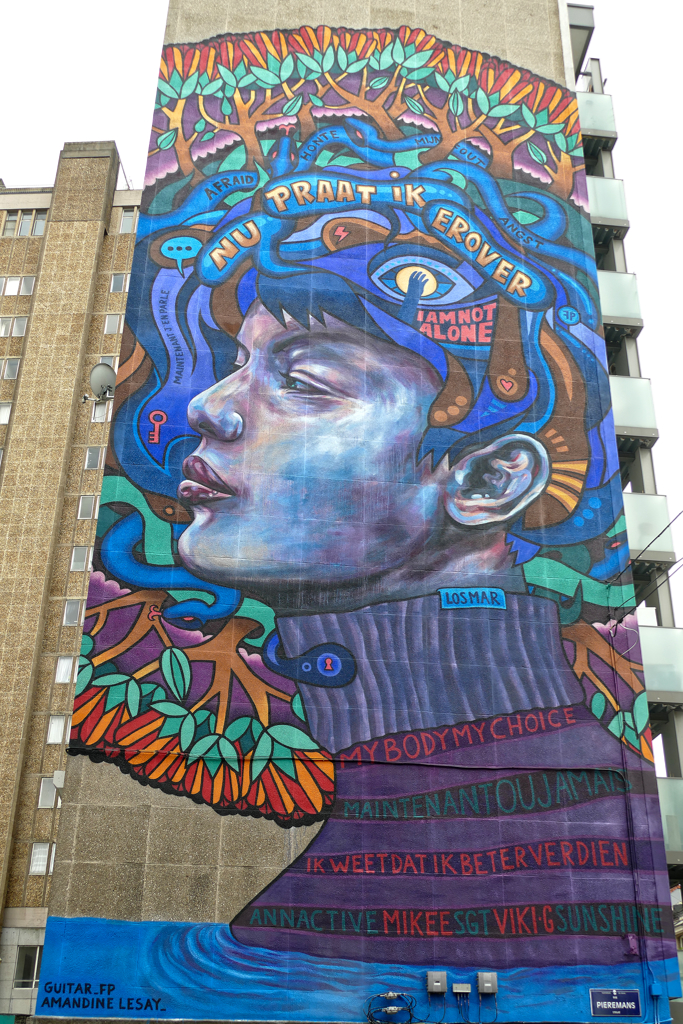
At the age of 20, she left the French capital and went to Brussels. Here, she studied painting and engraving in La Cambre.
Today, Amandine Lesay devotes herself entirely to creating works in public spaces. She specializes in portraits, which she turns into colorful murals. She merges human figures and urban environments.
NovaDead
Julien Crevaels aka NovaDead is a Belgian-Congolese artist. He is inspired by his childhood memories and connected to ancient African traditions.
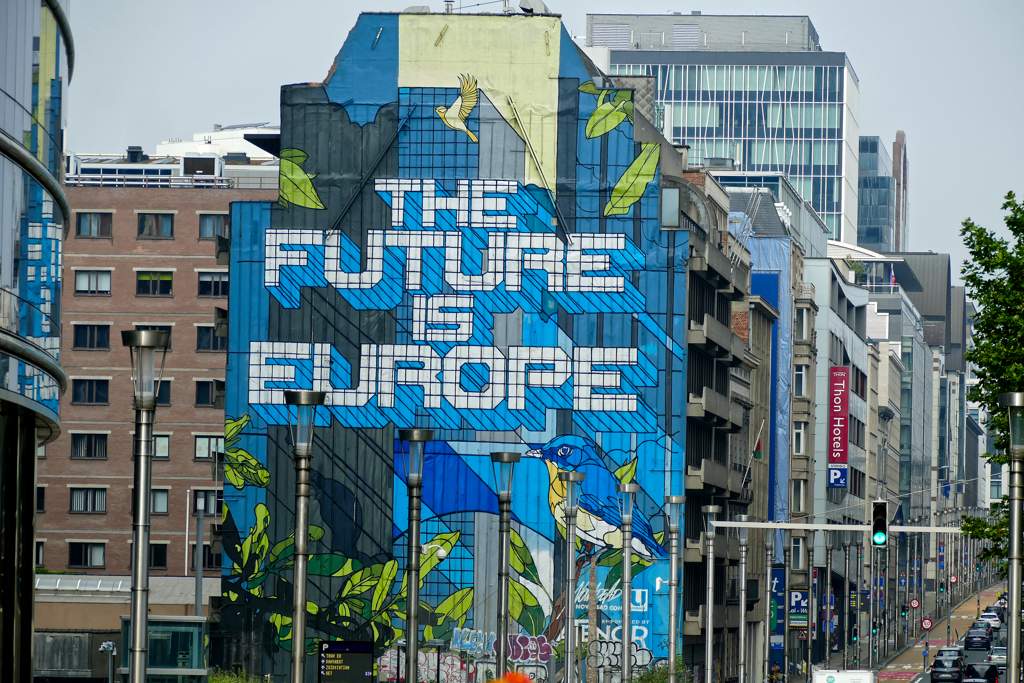
His distinctive style fuses the figurative with the abstract. Black lines and contours emphasize his bold works and make them appear like fragmented mosaics.
On Instagram
As in all my posts on urban art, I’m linking the artists’ Instagram accounts below. This way, you can check out the other works they created.
Jef Aérosol
Bruce Clarke
Jana Danilović
Laura Dauchet
Arno 2bal
DEMA
Guillaume Desmarets
Alba Fabre Sacristán
Freskolab
FSTN
Céleste Gangolphe
Blanca Gracia
HMI
Jaune
Mónika Kárándi
Ledia Kostandini
LaDame_QuiColle
Amandine Lesay
Florianne Mandin
Mathieu Mary
MEDIANERAS
MISS CHELOVE
Anthea Missy
Mr. Doodle
NEAN
Nô
NovaDead
ojoMAGico
SAINER
Sestry Feldman
SHIRO
Piotr Szlachta
Mona Tusz
VHILS
Edward von Lõngus
How To Get Around
Most of the murals I’m introducing in this post are located in the city center. This area is so small that you can cross it from one end to the other in about half an hour. I’d say that you can see all the street art in one day, and that includes some stops for refreshments or shopping.
Of course, you can also easily explore urban art in Brussels by bike. Several companies are renting out regular bicycles as well as e-bikes. However, I would only recommend this for tours outside the city center, as many streets and alleys are packed with people. Also keep in mind that Brussels can be quite hilly in places, which can also make cycling challenging. However, to get to the murals in the Sainte-Marie neighborhood, a bike is the perfect means of transportation.
Going Public
This being said, I’d like to point out that public transport in Brussels is just great. I would argue that the city has the best public transport network in all of Europe! There is a subway, there are trams and buses and everything is clean and reliable. It is also easy for foreigners and first-time visitors to find their way around. Timetables and maps are posted at all stops. Google Maps also shows you the best route between two spots.
Basically, contactless payment is the most convenient way of buying a ticket. Simply hold your bank card, smartphone, or smartwatch to the reader in the vehicle. A one-way trip costs €uro 2.10, the maximum daily price is €uro 7.50.
Remember that you still need to check in even if you have a physical ticket, whether for a single trip or a multiple ticket. In this case, you have to hold the ticket to another reader on the bus or tram. The turnstiles at the metro stations work for both ticket types. Don’t forget that at many metro stations, you have to tap your ticket again to leave the station.
Suppose you have a ticket for the Société des Transports Intercommunaux de Bruxelles network, STIB for short – this includes all metro lines, trams, and most bus lines. In that case, you cannot use it on buses operated by the company DeLijn! Within Brussels, these buses usually have an R in front of the number.
Map
This map should help you to find the murals I’m introducing in this post. Clicking on the slider symbol at the top left or the full-screen icon at the top right will display the whole map, including the legend.
Searching for Street Art as well as for comic-themed Comic Murals in Brussels were only two of many fun activities on my visits to Belgium’s capital. To read about what not to miss during your visit, go to my comprehensive guide Best Things to Do in BRUSSELS, the Capital of Europe. There you’ll find lots of valuable information that will make your own trip much smoother and more enjoyable. And if you have only a short layover in the city, my post 24 hours in Brussels has you covered.
Pinnable Pictures
If you choose to pin this post for later, please use one of these pictures:
